
- Countries & Regions
- International Organisations (IOs)
- Climate Change
- Counter Terrorism
- Disarmament
- Cybersecurity
- International Peacekeeping
- Singapore's Voluntary National Review
- Small States
- Sustainable Development
- Pedra Branca
- Singapore Universal Periodic Review
- Water Agreements
- Find A Singapore Overseas Mission
- Foreign Representatives To Singapore
- COVID-19 Information
- Travel Tips
- Visa Information
- I Need Help Overseas
- Passport Matters
- Legalisation of Documents
- Travel Advisories and Notices
- Useful links
- Press Statements, Transcripts & Photos
- Announcements and Highlights
- Experience Singapore
- Foreign Service Officer (Functional and Corporate)
- Foreign Service Officer (Political and Economic)
- Foreign Service Administration Specialist
- Job Opportunities
- Pre-University
- Undergraduate
- Foreign Service Scholarships
- Recruitment
- Scholarship
- Reach.gov.sg
Expand All | Collapse All

Entry and Exit
Australia has reopened its borders to travellers. For further information, please refer to the websites of the Australian Department of Home Affairs a nd Australian High Commission in Singapore .
For the latest updates on Australia’s COVID-19 situation, you may also wish to refer to the official website of the Australian Department of Health for information on public health travel advisory affecting travellers from Singapore. As entry restrictions may change at short notice, we advise you to contact your travel agency, or the nearest High Commission of Australia to ensure that you have accurate information for your specific purpose prior to departure.
Singaporeans are required to obtain a visa before travelling to Australia. Some visas can be applied online, while others need to be applied at the Australian Visa Application Centre (AVAC) in Singapore.
The Australian Department of Home Affairs provides that Singapore citizens visiting for short-term tourism or business may apply for the Electronic Travel Authority (visa subclass 601) via the ETA app (from Apple Store (Apple) or Google Play Store (Android) ) before their travels. The ETA, if granted, will be valid for one year and will allow Singapore citizens to visit multiple times for up to 90 days per visit. Singapore citizens may also apply for a Long Validity Visitor visa (visa subclass 600) at the Australian Visa Application Centre (AVAC) in Singapore. Applicants must provide their personal biometric identifiers when they apply for the visa. The visa, if granted, will be valid for six years and will allow Singapore citizens to visit multiple times for up to 90 days per visit. As visa requirements often change at short notice, we advise you to contact your travel agency, or the Australian High Commission in Singapore for up-to-date information.
Australia commits to strict biosecurity policies to protect its unique environment and its human, animal and plant health. Before you arrive in Australia, you will be given an Incoming Passenger Card. You must mark “YES” on your card if you are carrying, on your person, in your luggage or carry-on, goods that may pose a biosecurity risk, such as plant material, animal products, certain food, traditional medicine or herbs and wooden articles. You must declare honestly as false or misleading declaration is a serious offence in Australia. For more information on biosecurity, you may visit the Department of Agriculture and Water Resources website.
Visitors or long-term stayers in Australia must ensure they do not overstay beyond their given visa period. Overstaying is taken very seriously by the Australian Border Force and may also result in difficulties for future visits to Australia. Hence, if you intend to stay longer than the period granted on your visa, or find out that your visa has expired, you must seek advice from the nearest Department of Home Affairs office. Further information and guidance can be found on the Australian Border Force website.
Safety and Security
While Australia is generally safe, there have been incidents of pickpocketing, apartment break-ins or vehicle break-ins. Hence, you must exercise precautions on personal safety and over your belongings at all times. Vehicle break-ins are particularly common in tourist spots in Western Australia, for which care must be taken not to leave belongings unattended in your rental/vehicles, to avoid, among others, the loss of your passport, wallet, bag, other valuable items, and incurring fees payable for a damaged rental vehicle.
Australia is geographically almost as large as the United States. Visitors to Australia often underestimate the distances taken to travel from one location to another. Interstate overland travel (by car for example) across Australia can last hours to days. Distance-driving under unfamiliar road and weather conditions along with irregular mobile phone connectivity in rural areas heightens the risk to a foreign driver’s safety and well-being. If driving, it is important that you plan your journeys carefully, and take frequent rest breaks. Where possible, also consider alternative travel options such as bus or coaches, when visiting remote tourist spots. If you plan to drive, please ensure that you bring along your passport and driving licence, familiarise yourself with and adhere to road and traffic rules in the state that you are travelling.
Australia imposes strict penalties for any driver that flouts traffic and road rules.
It is strictly illegal, in all Australian states, if the driver or passenger does not wear a seatbelt. In Western Australia, for example, not wearing a seatbelt will result in a penalty of the minimum of AUD 550.00 as a passenger. Drivers are responsible for their passengers, and will also be penalised just as much if any passenger is unrestrained. Please refer to Tourism Australia for a guide on Australia’s road rules and regulations.
Causing harm in any traffic accident in any state in Australia is a serious offence, and offenders will be prosecuted, with the potential for severe penalties including jail time.
Citizens who are detained by law enforcement authorities in Australia can request Consular access, and the authority will procedurally offer Consular access to detained foreigners. Any detained citizen will need to expressly consent to Consular access before the Singapore High Commission can render assistance to them.
Additional Information
Visitors to Australia should note that bushfires are not uncommon in Australia during hotter months. Visitors should pay attention to local media and monitor for news of bushfires in the area. If asthmatic, such visitors should exercise precautions such as staying indoors or wearing a mask when outside. For more information on bushfires, visit the Australian Bureau of Meteorology (BOM) website or refer to the relevant websites below on air quality and other alerts in the respective States:
Australian Capital Territory
• ACT Emergency Services Agency
• Air Quality in ACT
New South Wales
• NSW Rural Fire Service
• 'Fire Near Me' app
• Air Quality in NSW
Northern Territory
• NT Fire and Rescue Services
• Air Quality in NT
• QLD Fire & Emergency Services
• Air Quality in QLD
South Australia
• SA Country Fire Service
• Air Quality in SA
• Tasmania Fire Service
• Air Quality in Tasmania
• Victorian Country Fire Authority
• Air Quality in Victoria
Western Australia
• WA Department of Fire and Emergency: Services
• Air Quality in WA
General Travel Advice
Overseas Travel – Be Informed & Be Safe [Updated on 5 February 2024]
Singaporeans planning overseas travel are reminded to take the necessary precautions, including being prepared to deal with accidents, natural disasters or terrorist attacks. Singaporeans are also reminded to be familiar with your destination’s local laws, customs, and COVID-19 regulations.
Demonstrations do occur in major cities across the world. Such demonstrations can sometimes escalate into violence. It is important for Singaporeans to keep abreast of local news, avoid any protests or demonstrations and heed the advice of the local authorities.
When participating in outdoor leisure activities overseas, Singaporeans should be mindful that certain sporting activities, especially in open seas, may carry risks. Besides ensuring that one has the physical competencies and appropriate condition to undertake the activity, every effort should be made to ascertain if the trip organiser or guide is reliable and competent, and that appropriate safety and contingency plans are in place. When in doubt, Singaporeans should consult the relevant professional bodies or sporting associations for specific advice.
For those planning to travel, here are some tips:
Before travelling
- Familiarise yourself with our network of overseas missions.
- Purchase comprehensive travel insurance and be familiar with the terms and coverage.
- Equip yourself with research about your destination’s entry requirements, current situation, local laws and customs.
- eRegister with us on our website ( www.mfa.gov.sg ) so that we may reach out to you during an emergency.
While travelling
- Always take care of your personal safety, remain vigilant and monitor local weather news, advisories, and security developments.
- Exercise caution around large gatherings and avoid locations known for demonstrations or disturbances.
- Be prepared for possible delays and last-minute changes in travel plans especially during unforeseen events such as natural disasters, social unrest or terror attacks.
- Stay connected with your friends and family. Inform them of your whereabouts and provide them with your overseas contact details.
- In the event that you require consular assistance, please contact the nearest Singapore Overseas Mission or call the Ministry of Foreign Affairs Duty Office at +65 6379 8800/+65 6379 8855.
Advisory: Email Scams
There have been reports of individuals receiving scam emails/messages purportedly sent from friends in distress overseas. These emails/messages typically originate from an email address/social media known to the receiver bearing claims of the sender getting into trouble overseas and urgently requesting financial assistance. The sender would also claim to have approached a Singapore Embassy/Consulate and the local Police for help to no avail.
MFA takes the safety of all Singaporeans very seriously. Singaporeans in distress approaching our Overseas Missions for assistance will be rendered with all necessary consular assistance. If you receive such emails/messages from purported friends seeking funds transfers, we strongly advise you to call them first to verify the authenticity of the emails/messages before responding to their request. It is also not advisable to give out any personal information such as NRIC/passport numbers, address, telephone number, etc. Any form of reply, even one of non-interest, could result in more unsolicited emails. Members of the public who suspect that they have fallen prey to such scams should report the matter to the Police immediately. Should Singaporeans abroad require consular assistance, they can contact the nearest Singapore Overseas Mission or call the Ministry of Foreign Affairs 24-hr Duty Office at +65 6379 8800/+65 6379 8855.
The Ministry of Foreign Affairs is a ministry of the Government of Singapore responsible for conducting and managing diplomatic relations between Singapore and other countries and regions.
Travel Page
Australia entry requirements for Singaporean Citizens
All Singaporean nationals must obtain a visa to travel to Australia . When visiting on holiday, for business, or when transiting through the country, they can apply for the Australian Electronic Travel Authority (ETA) .
You can apply for this convenient travel authorisation rapidly through the online platform.
Basic information about ETA for Singapore
The Australian ETA for Singapore is an electronic visa that can be obtained online in a matter of minutes.
Since Singaporean applicants receive their visa by email , there is no need to contact an Australian embassy or consulate before travelling.
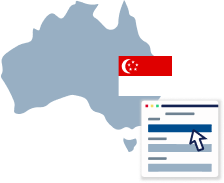
Permitted travel purposes with an Australian ETA from Singapore
Singaporean travellers can use the ETA when travelling to Australia for one of the following reasons:
- Tourism or leisure
- To see family or friends
- Business (meetings, conferences, seminars, courses)
- Short-term volunteering (this must not be the main reason for travelling to Australia)
Can Singaporeans use an ETA to work in Australia?
No. Singaporean nationals cannot use their ETA to engage in paid work in Australia.
Can Singaporean citizens get a visa on arrival in Australia?
Unlike some other countries, Australia does not offer visas on arrival. This means that travellers from Singapore cannot get an ETA at the airport . They must hold a valid visa before arriving at the border crossing.
Health and safety requirements to get an Australian ETA from Singapore
Singaporeans who intend to travel to Australia must be in good health . They should not require extensive treatments that would restrict access to medical services for Australian citizens. In addition, they must not suffer from medical conditions that could compromise the safety of the Australian population.
Other than meeting the above health requirements, Singaporeans visiting Australia must not have a criminal record with serious offences or convictions with a prison sentence of 12 months or more.
Singaporean citizens are required to answer health and security-related questions as part of their ETA application process.
Australian ETA processing time for Singaporean applicants
Singaporean candidates will receive an email confirmation as soon as they submit the application.
The Australian ETA processing time is up to 24 hours , unless there are mistakes or discrepancies in the application form. In this case, candidates are asked to start a new application process and pay another visa processing fee.
What should Singaporean travellers do after they receive the ETA for Australia?
Singaporean applicants are advised to print the Australian ETA . They should be prepared to present it, along with a valid passport, at the border crossing.
Please note that having an ETA does not guarantee entry into Australia from Singapore. This right is determined by the border immigration officials at the port of entry, after having examined the passenger’s travel documentation.
Travellers from Singapore can check the status of their ETA application at any time by following the link included in the confirmation email.
Validity of ETA for Australia from Singapore
The validity of Australian ETA for Singapore is one year from the date of the issue .
The Australian ETA is a multiple entry visa that can be used for any number of trips within its validity period. The duration of each trip must not exceed 90 days (3 months).
Can Singaporean nationals renew their ETA for Australia?
No. The Australian ETA cannot be renewed. Singaporean visitors who would like to extend their trip have two different options:
- They can apply for another ETA from outside of Australia at least two weeks before their visa expiration date
- They can apply for another type of Australian visa suitable for longer stays
What are the consequences of overstaying an Australian ETA for Singapore?
Overstaying an Australian ETA is strictly against the law . Depending on the number of days overstayed, Singaporean travellers may be required to pay fines and even lose the right to obtain another Australian visa in the future.
- Reward types, points & expiry
- What card do I use for…
- Current Credit Card Sign Up Bonuses
- Credit Card Lounge Benefits
- Credit Card Airport Limo Benefits
- Credit Card Reviews
- Points Transfer Partners
- Singapore Airlines First & Business Class Seat Guide
- Singapore Airlines Book The Cook Wiki
- Singapore Airlines Wi-Fi guide
- The Milelion’s KrisFlyer Guide
- What is the value of a mile?
- Best Rate Guarantees (BRGs) for beginners
- Singapore Staycation Guide
- Trip Report Index
- Credit Cards
- For Great Justice
- General Travel
- Other Loyalty Programs
- Trip Reports
Singapore-Australia travel: Summary of COVID-19 testing requirements
Travelling to Australia? Here's all you need to know about pre-departure, on-arrival and post-arrival COVID-19 test requirements.
Even though the Australian federal government sets the overall policy for entering the country, each state/territory is empowered to set its own rules for on-arrival and post-arrival testing.
It basically means you’re dealing with eight different sets of rules, when talking about travel to Australia.
In this post, we’ll look at the detailed COVID-19 testing requirements for entering Australia, as well as on-arrival and post-arrival testing obligations.
Pre-departure testing
Australia has eliminated its pre-departure test requirement for fully vaccinated passengers, effective 18 April 2022.
Travellers from Singapore simply need to complete a Digital Passenger Declaration within 72 hours of departure. Do note the following instructions:
If you are departing for Australia on or after 18 April, you no longer need to provide a pre-departure COVID test. While the DPD system transitions to these new arrangements you will need to select I am exempt from Australia’s COVID testing requirements in the health section of the DPD. This will produce the outcome confirmation required at check-in . Don’t be concerned about this outcome – you will be processed as meeting the COVID-19 health requirements for boarding as long as you can show evidence of your COVID-19 vaccination record or acceptable proof that you cannot be vaccinated for medical reasons documentation at check-in.
Singaporeans (and nationals of other ETA-eligible countries ) must also apply for an Electronic Travel Authority (ETA), which costs A$20 and allows unlimited entries for a 12-month period, capped at 3 months at a time.
On-arrival testing
Act, nsw, qld, sa, vic.
Travellers must take an ART within 24 hours of arrival (SA doesn’t actually specify a timeframe, but 24 hours should be safe), and isolate until a negative result is received. However, since self-administered ARTs are acceptable, you could bring along an ART kit and essentially finish isolation within 15 minutes of landing.
ART kits in Australia are overseen by the Therapeutic Goods Administration (TGA). The TGA has a list of approved home test kits , as well as a copy of the manufacturer’s instructions for each test.
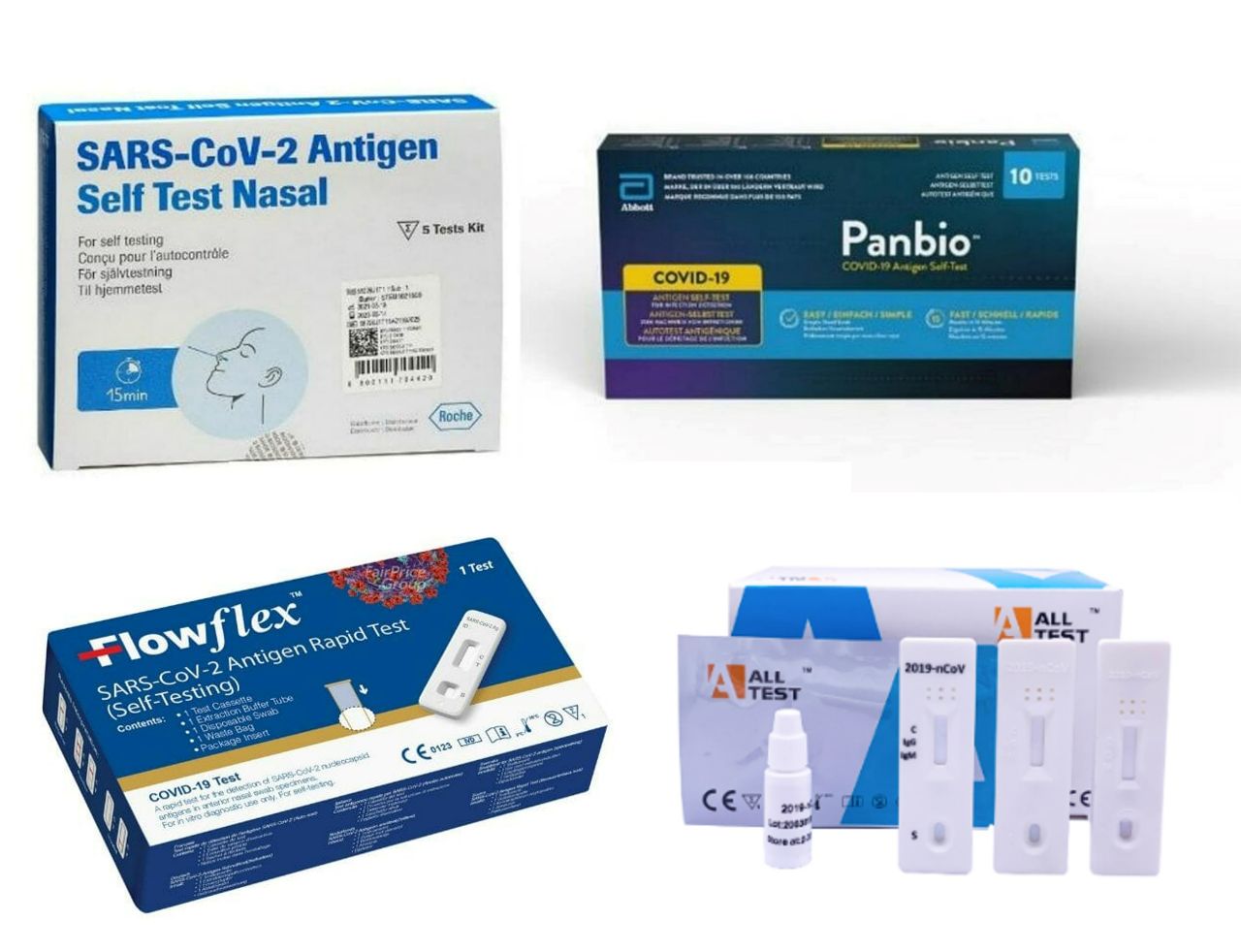
Four of the kits sold in Singapore pharmacies are approved in Australia, namely:
- Abbott Panbio COVID-19 Antigen Self-Test
- Flowflex SARS-CoV-2 Antigen Rapid Test
- Hangzhou Alltest SARS-CoV-2 Antigen Rapid Test
- SD Biosensor SARS-CoV-2 Antigen Self Test Nasal
With regards to SD Biosensor, note that it’s the white kit with blue text that’s approved for use in Australia, not the white kit with pink text (Standard Q).
For further details, refer to the posts below:
- Western Australia drops on-arrival COVID-19 test requirement
- South Australia downgrades on-arrival COVID-19 test from PCR to ART
What if you’re transiting between states with different requirements?
If you’re transiting between states with different requirements, you should follow the rules of your final destination. This is provided your transit does not exceed the testing window allowance.
If you’re landing in a state/territory that does not require on-arrival testing (e.g. NT) but subsequently travelling to a different state, take note that additional testing may be required.
- NT to ACT : ART within 24 hours, if overseas in the past 7 days
- NT to NSW : No testing required
- NT to Queensland : ART within 24h, if overseas in past 14 days
- NT to SA : No testing required
- NT to Tasmania : No testing required
- NT to Victoria : ART within 24h, if overseas in past 14 days
- NT to Western Australia : No testing required
Post-arrival
While certain states previously had post-arrival testing requirements (e.g. NT required travellers to take further ARTs on Days 3 and 6), these have all been eliminated for now.
Returning to Singapore
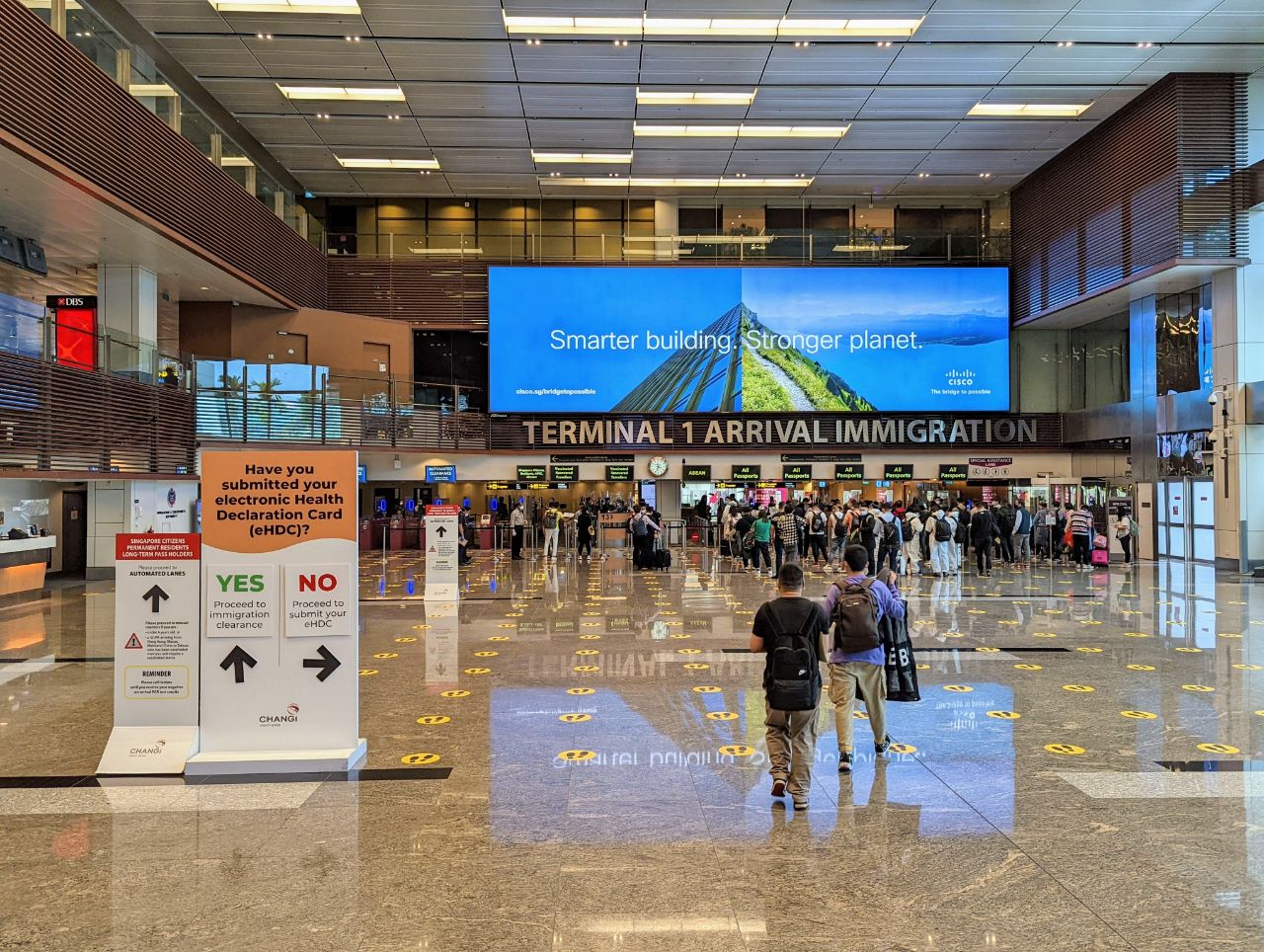
Fully vaccinated travellers can enter Singapore under the Vaccinated Travel Framework (VTF) without quarantine or on-arrival testing.
They are merely required to take a pre-departure ART or PCR test within 2 days of departure to Singapore. For Singapore Citizens, Permanent Residents and Long Term Passholders, this can be a remotely-supervised tele-ART.
Cheapest overseas tele-ARTs for pre-departure testing to Singapore
For the full details on VTF travel, refer to the post below.
Complete Guide: Singapore’s quarantine-free Vaccinated Travel Framework (VTF)
Australia has scrapped pre-departure testing for all fully vaccinated travellers, making the arrivals process fairly straightforward. Some states are retaining on-arrival testing for now, but all requirements can be satisfied with a simple self-administered ART, meaning minimal isolation time (if any).
I anticipate that on-arrival test requirements will be further eased or removed over the next few weeks and months.
Similar Articles
Baby on board: learnings from one year of travel with the milecub, extended: earn 4 mpd on travel insurance with singsaver, 21 comments.
So in practice, I guess most of us would land, do an ART at a quiet place in the airport, and then continue with our holiday from there as per usual? No need to submit results on an app or anything right?
It would be more disruptive if we didn’t plan for the contingency of testing positive (whether symptomatic or not), eg car rental, subsequent hotel cancellations. I would still plan to stay a few days (near airport or in the city) before starting the car rental. This way you have a confirmed place to stay even if positive. Then make changes to the plan when you recover.
With regard to children under the age of 5, is it by actual birthday or calendar year (which Singapore uses)? This is the confusion amongst the different treatments everywhere.
It will be by their actual birthday. Until their 5th birthday they are 4 years old.
Aaron, for my case of arrival and entering Melbourne at D1 but taking a a domestic flight to Hobart (Tasmania) on D2, is my understanding of no PDT in Melbourne and on arrival test in Hobart is required correct? Thanks.
victoria requires you to do an ART by the end of a 24 hour period after arrival. but if at that time, you’re no longer in victoria, i dont see why you have to fulfill the victoria requirement. tasmania does not have any test requirement, so i wouldn’t do any test.
Here’s my confusion on return from Hobart (Tasmania) to Singapore via Melbourne. If there’s technically no requirement for PDT to Tasmania, does that mean i technically wont be stopped from flying out of Tasmania for the Hobart – Melbourne leg and instead just test in Melbourne Airport upon arrival to clear me on Melbourne requirements plus the Melbourne – Singapore leg?
Or am I not making sense at all?
did you manage to get this cleared? I’m going on the same trip. sg -melbourne – hobart – melbourne – sg. and im unsure if i need to take PDT in hobart
Not yet, my travel dates are only end April. To be safe, i’m still on my adjusted itinerary to block out time to take PDT in Hobart. And to cater for a second PDT in Melbourne airport in case as calculating my flight length would put me out of the 24hour range by the time i transit for melb-sin. Check the tasmania covid site for a list of test centres regardless. If your trip is earlier than mine, please update!
When doing pre-departure ART in Singapore via DoctorAnywhere Tele-ART, do we need to use one of the 4 approved kits? Does the type of kit used show up in the Tele-ART cert? Thanks.
You can use any kit approved in sg
If we are tested positive before departure back to Singapore, are we able to stay at any accommodation (eg air bnb) to recover or it has to be Brisbane government nominated accommodation?
Can someone please confirm if i need PRE-departure covid-19 test when travelling from Singapore to Perth? The article text above suggests pre-departure test is required, but the Summary Table says it is not : only need ART test after arrival. thanks.
the summary table doesn’t say it’s not needed…
If I recently recovered from COVID and have a discharge memo from MOH, can I use this to board the plane from Australia to Singapore instead of doing the pre-departure supervised test in Australia?
Also, can I use this to go to Australia? Australia website says certificate from medical practitioner, so wondering if anyone has tried. Thanks!
the Dept of Health website states one of the RAT PDT requirements is to have:
- the brand and make of the test (for RAT tests)
do you know if any of the tele-ART in Sg is able to state this in the results?
DA does. i did it for USA travel recently.
The post arrival for Melbourne at least don’t seem enforced in any way i.e. nobody reminds you to do it and nobody checks. So it’s pretty much on a good faith basis and no doubt will be scrapped entirely soon.
It has just been announced by the Victorian Government that international arrivals who are symptoms free are recommended but not required to take a rapid/PCR test.
https://twitter.com/sharnellevella/status/1516584840673435650
CREDIT CARD SIGN UP BONUSES
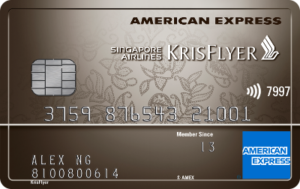
Featured Deals

© Copyright 2024 The Milelion All Rights Reserved | Web Design by Enchant.sg

Search Smartraveller
Changes to the covid-19 testing requirements for inbound travel to australia.
Last updated: 22 January 2022
The Australian Government has announced changes to the COVID-19 testing requirements for inbound travel to Australia. You still need to provide evidence of a negative COVID-19 test before you board your flight. But more test types will now be accepted.
Tests can be either:
- A nucleic acid amplification (NAA) test - such as a PCR test - done within 3 days before the day of the flight’s scheduled departure, or
- A rapid antigen test (RAT), taken under the supervision of a medical practitioner , within 24 hours of the flight’s scheduled departure time.
Serology tests are not accepted.
Test results can be paper-based or electronic but must meet certain requirements .
In addition, the time between receiving a positive test result and being able to be cleared for travel to Australia will be reduced from 14 to 7 days.
These changes will start from 1am AEDT on 23 January 2022.
You’ll still need to wear a mask during your flight and comply with state and territory government requirements for quarantine and testing when you arrive.
For more information about which COVID-19 tests can now be used for inbound travel, visit the Department of Health.
Tested positive? Find out what to do if you test positive in a pre-departure test .
- Changes to pre-departure testing for international arrivals to Australia (Department of Health)
- Australia’s re-entry and quarantine requirements
Australia Travel Restrictions
Traveller's COVID-19 vaccination status
Travelling from Singapore to Australia
Open for vaccinated visitors
COVID-19 testing
Not required
Not required for vaccinated visitors
Restaurants
Not required in public spaces.
Ready to travel?
Find flights to australia, find stays in australia, explore more countries on travel restrictions map, destinations you can travel to now, dominican republic, philippines, puerto rico, south korea, united kingdom, united states, know when to go.
Sign up for email alerts as countries begin to open - choose the destinations you're interested in so you're in the know.
Can I travel to Australia from Singapore?
Most visitors from Singapore, regardless of vaccination status, can enter Australia.
Can I travel to Australia if I am vaccinated?
Fully vaccinated visitors from Singapore can enter Australia without restrictions.
Can I travel to Australia without being vaccinated?
Unvaccinated visitors from Singapore can enter Australia without restrictions.
Do I need a COVID test to enter Australia?
Visitors from Singapore are not required to present a negative COVID-19 PCR test or antigen result upon entering Australia.
Can I travel to Australia without quarantine?
Travellers from Singapore are not required to quarantine.
Do I need to wear a mask in Australia?
Mask usage in Australia is not required in public spaces.
Are the restaurants and bars open in Australia?
Restaurants in Australia are open. Bars in Australia are .
The Straits Times
- International
- Print Edition
- news with benefits
- SPH Rewards
- STClassifieds
- Berita Harian
- Hardwarezone
- Shin Min Daily News
- Tamil Murasu
- The Business Times
- The New Paper
- Lianhe Zaobao
- Advertise with us
askST: Can Singaporeans travel to Australia?
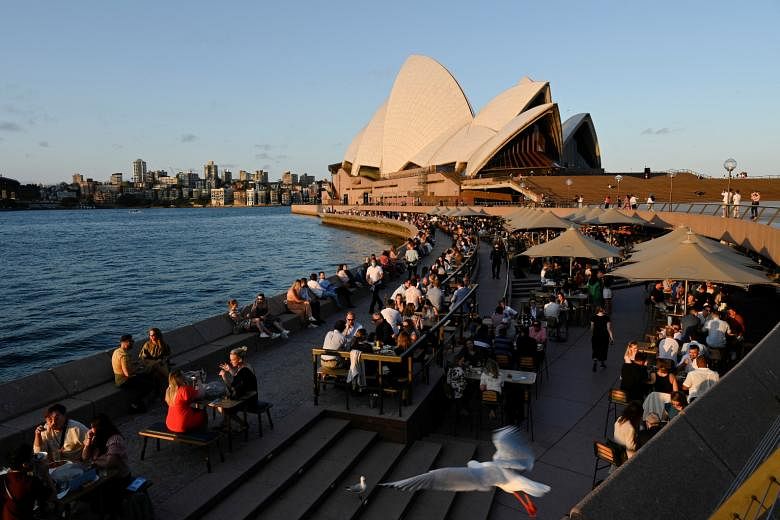
SINGAPORE - On Monday (Feb 7), Australian Prime Minister Scott Morrison said Australia will fully reopen its borders from Feb 21 to all travellers , such as tourists and students, who hold visas and are double-vaccinated.
This ends a two-year closure since March 2020 when the country shut its borders to mitigate against the surging Covid-19 pandemic.
It later started to gradually ease its border restrictions, such as starting travel bubbles with countries like Singapore.
But even with the latest announcement by Australia, travellers will still need to be wary of travel and testing rules, which can vary by state.
The Straits Times answers some questions on Australia's border restrictions, such as which states are open and who can travel there.
Q: Can Singaporeans travel to Australia?
Eligible citizens of Singapore who are fully vaccinated have already been able to travel to some parts of Australia without seeking a travel exemption under a travel bubble between Singapore and Australia.
The arrangement, which kicked in from Nov 21, allows for quarantine-free travel to participating Australian states and territories. Travellers, however, need to adhere to certain requirements, such as undertaking the required Covid-19 tests and flying directly from Singapore to Australia without any transit in between.
From Feb 21, Australia will further ease its border measures by allowing all fully vaccinated visa holders to travel to Australia without seeking a travel exemption.
This would also include eligible non-citizens in Singapore who cannot travel under the travel bubble arrangement.
Those who do not want to be quarantined when they return to Singapore can use the vaccinated travel lane arrangement that Singapore has with Australia, provided they comply with the requirements.
Travellers who return to Singapore from Australia on non-VTL flights would be subjected to prevailing border control measures including serving a seven-day stay-home notice.
Q: Which parts of Australia can I travel to?
Participating states under Singapore's travel bubble with Australia currently include New South Wales, Victoria, Tasmania, the Australian Capital Territory, the Northern Territory, Queensland and South Australia.
Only Western Australia is not part of the arrangement.
If an eligible Singapore citizen seeks to travel onwards to another Australian state or territory other than those participating, they must adhere to all entry rules of that state or territory, including quarantine and post-arrival testing requirements.
Q: Who can enter Western Australia?
Western Australia, which includes Perth, is still largely closed off to visitors.
Only approved travellers are allowed to enter the state, with testing and quarantine requirements.
These include people with direct legitimate family connections who are entering to reconnect with family members, or people entering for urgent and essential medical treatment.
Those who enter Western Australia will also need to be quarantined - seven days for vaccinated travellers, and 14 days for those who are not vaccinated.
International students who manage to arrive in Australia before midnight on Feb 5 can apply to enter Western Australia as a returning student through interstate travel.
Students who arrive in Australia after midnight on Feb 5 will not be able to enter Western Australia as a returning student. They will need to fufil other requirements to enter.
Q: What are some of Australia's travel rules by state?
Each state in Australia implements its own testing and quarantine restrictions, depending on the Covid-19 situation in the state.
For most states, such as Queensland, South Australia and Victoria, fully vaccinated travellers must isolate until a Covid-19 test is taken within 24 hours of arrival.
New South Wales also requires additional testing on or after day six of arrival.
For Tasmania, no quarantine or testing is needed for fully vaccinated travellers.
Meanwhile, Western Australia still requires seven days of quarantine, even for those who have been vaccinated.

Join ST's WhatsApp Channel and get the latest news and must-reads.
- Vaccinated Travel Lane/VTL
Read 3 articles and stand to win rewards
Spin the wheel now

- Minister for Foreign Affairs
- Minister for Women
Senator the Hon Marise Payne
- Media Releases
- Transcripts
This content has been archived.
Singapore – australia’s next steps to reopening to the world.
- Joint media release with:
- The Hon Scott Morrison MP, Prime Minister
- The Hon Dan Tehan MP, Minister for Trade, Tourism and Investment
Australia will welcome back fully vaccinated Singaporean travellers in November as part of our step by step and safe reopening to the world.
The quarantine-free travel arrangements will commence on November 21 for Australian states and territories that are ready, and will be available for fully vaccinated Singaporeans travelling from Singapore who present a negative PCR test taken within 72 hours of departure.
Prime Minister Scott Morrison announced the agreement at the G20 Leaders’ Summit in Rome, following a meeting with the Prime Minister of Singapore Lee Hsien Loong.
“Australia is slinging its doors open to fully vaccinated Singaporean travellers in November,” the Prime Minister said.
“This is another significant milestone in our step by step approach to safely reopening to the world that we outlined in the National Plan.
“It follows the announcement this week that fully vaccinated travellers from New Zealand will be welcomed back in October.
“This means within weeks Australia will be welcoming tourists from two of our top ten travel destinations. This is the billion dollar boost that Australia’s tourism industry has been waiting for.
“Step by step, everything that we know and love about Australia is inching back to normal.”
Minister for Foreign Affairs and Minister for Women Senator Marise Payne said this arrangement followed Singapore’s recent announcement to welcome fully vaccinated Australians.
“Many Australians live and work in Singapore and vice versa. The strong exchanges over many decades have been to the benefit of both our nations,” Minister Payne said.
“It attests to the strength of our friendship and the effective management of COVID in each of our countries that we have been able to agree this early step in the reopening of normal travel.
“As we continue with our shared regional recovery from the pandemic, the resumption of travel between Singapore and Australia will provide great opportunities to move forward.”
Minister for Trade, Tourism and Investment Dan Tehan said this was the next logical step in reopening to the world.
“Australia remains a popular, world-leading destination and this is just the start of our international tourism comeback,” Minister Tehan said.
“Australia’s tourism operators and the sector’s 660,000 workers will welcome back with open arms visitors from Singapore.
“Quarantine-free arrivals demonstrate the success of our National Plan and the strength of our recovery.”
Details of arrangement include:
- Singaporeans must depart from Singapore to be considered eligible
- No requirement to have spent 14 days in Singapore prior to travel
- No requirement for quarantine upon arrival to Australia
- Arrangements will commence from 21 November with participating jurisdictions including New South Wales and Victoria.
Media enquiries
- Entering, Transiting and Departing
Entering Singapore
To ensure a smooth journey, travellers seeking to enter Singapore should comply with the Entry and Public Health requirements listed below.
1) General Entry Requirements
To enter Singapore, travellers must meet the following immigration requirements:
i) Passport Validity
- Have minimum 6-month passport validity if you are not a Singapore passport holder
- Short term travellers holding a passport or travel document from a visa-required country/region must apply for a Visa
- Visa-required travellers can use the Visa-Free Transit Facility for stay of less than 96 hours in Singapore, if eligible
iii) Security and Immigration Processes on Arrival
- Ensure that you do not bring prohibited items into Singapore
- Familiarise yourself with the Checkpoint's Entry clearance procedures , including whether you are eligible for automated clearance
- Short-Term travellers should have sufficient cash and proof of onward travel (tickets, visas), and ensure that you do not stay beyond your visit pass validity. You may retrieve your e-Pass after arrival using the e-Pass Enquiry Portal or check your visit pass validity using the visit pass validity tool .
iv) Customs Declaration
- Make a Customs declaration and tax payment using the Customs@SG web application before arrival if you are entering Singapore with goods exceeding your Goods and Service Tax (GST) import relief and/or Duty-free concession . For more information, please refer to Baggage Clearance/Dual-Channel System .
- Those transiting/transferring through Singapore without seeking immigration clearance; and
- Singapore citizens, Permanent Residents and Long-Term Pass Holders entering via land checkpoints.
Submission of SGAC is Free and can be done via the SGAC e-Service or MyICA Mobile app . Please refer to SGAC with Electronic Health Declaration for more information.
Short Term Visitors
- Visitors who wish to stay beyond the period of stay granted can apply for a visit pass extension online using the e-Service . Applications are subject to approval.
- Travellers on short-term visit pass are also not permitted to engage in any business, professional or paid employment activities when in Singapore. Overstaying is also a punishable offence in Singapore.
2) Public Health Requirements
To avoid tests and quarantine, travellers must fulfil the public health requirements below. Travellers who cannot meet the public health requirements and refuse any test(s) and/or quarantine may be turned away from Singapore.
Produce an International Certificate of Vaccination for Yellow Fever , if you have visited any country at risk of Yellow Fever transmission in the six (6) days prior to arrival in Singapore.
Travellers must serve quarantine for six (6) days from date of departure from countries with risk of yellow fever transmission if they cannot meet the requirement. Quarantine also applies to those who are ineligible to receive the vaccination e.g., children aged one year and below and individuals with contraindications, and travellers whose yellow fever vaccination certificate has yet to become valid.
There are no longer any COVID-19 measures for travellers arriving in Singapore from 13 Feb 2023 , regardless of vaccination status or traveller profile.
Related Links
- Entry for Sea Crew/Pleasure Craft Owners
- Cargo and Postal Article Requirements
- Woodlands and Tuas Checkpoints Traffic Updates
- Requirements for Transiting in Singapore
- Taking Cash In and Out of Singapore
- Use of QR Code for Immigration Clearance at Woodlands and Tuas Checkpoints

Australia Recommends 2024

Travel Inspiration

G'day, the short film

Discover your Australia

Travel videos

Deals and offers

Australian Capital Territory

New South Wales

Northern Territory

South Australia

Western Australia

External Territories

The Whitsundays

Mornington Peninsula

Port Douglas

Ningaloo Reef

Airlie Beach

Kangaroo Island

Rottnest Island

Hamilton Island

Lord Howe Island

Tiwi Islands

Phillip Island

Bruny Island

Margaret River

Barossa Valley

The Grampians

Hunter Valley

Yarra Valley

McLaren Vale

Glass House Mountains

Alice Springs

Uluru and Kata Tjuta

The Kimberley

Flinders Ranges

Kakadu National Park

Eyre Peninsula

Karijini National Park

Great Barrier Reef

Blue Mountains

Daintree Rainforest

Great Ocean Road

Purnululu National Park

Cradle Mountain-Lake St Clair National Park

Litchfield National Park

Aboriginal experiences

Arts and culture

Festivals and events

- Food and drink

Adventure and sports

Walks and hikes

Road trips and drives

Beaches and islands

Nature and national parks

Eco-friendly travel

Health and wellness

Family travel

Family destinations

Family road trips

- Backpacking

Work and holiday

Beginner's guide

Accessible travel

Planning tips

Trip planner

Australian budget guide

Itinerary planner

Find a travel agent

Find accommodation

Find transport

Visitor information centres
Deals and travel packages

Visa and entry requirements FAQ

COVID-19 travel and entry advice

Customs and biosecurity

Working Holiday Maker visas

Facts about Australia

Experiences that will make you feel like an Aussie

People and culture

Health and safety FAQ

Cities, states & territories

Iconic places and attractions

When is the best time to visit Australia?

Seasonal travel

Events and festivals

School holidays

Public holidays
How to get to Australia's most iconic cities

How long do I need for my trip to Australia?

How to travel around Australia

Guide to driving in Australia

How to hire a car or campervan

How to plan a family road trip

How to plan an outback road trip

Come and say G'day

Uluru, Northern Territory © Tourism Australia
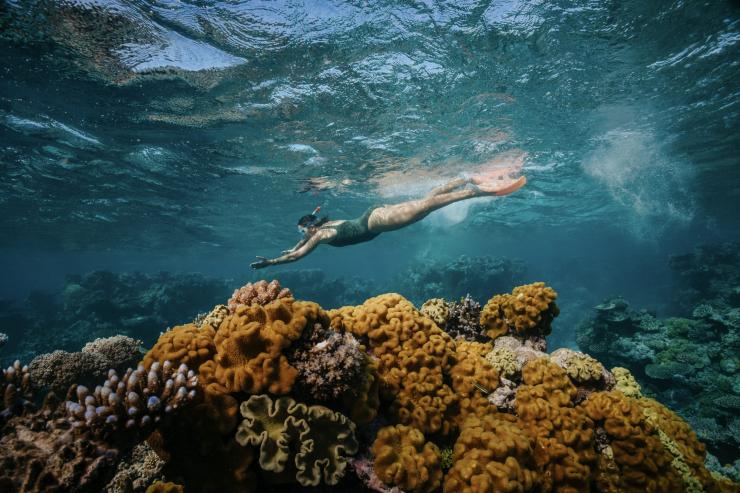
15 places to Come and Say G'day in 2024
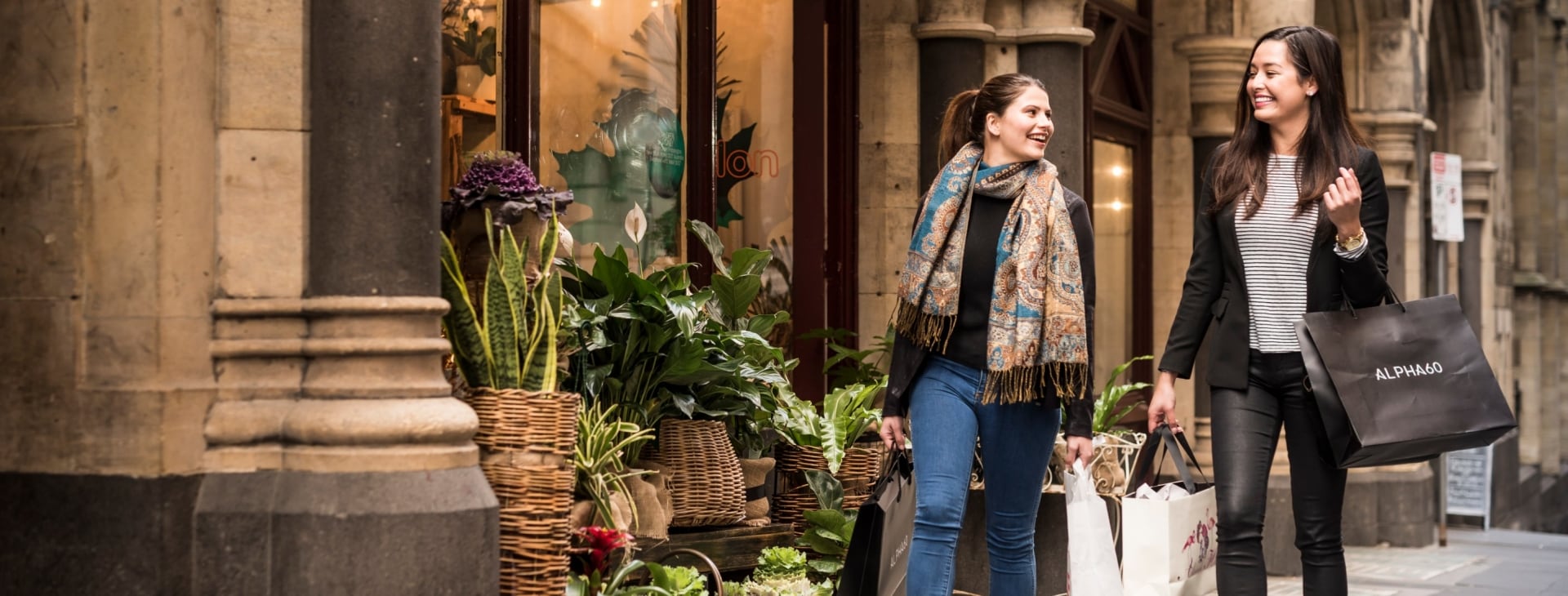
Experience Australia with Singapore Airlines from $538*
Top places to go.

The best adventure holiday destinations
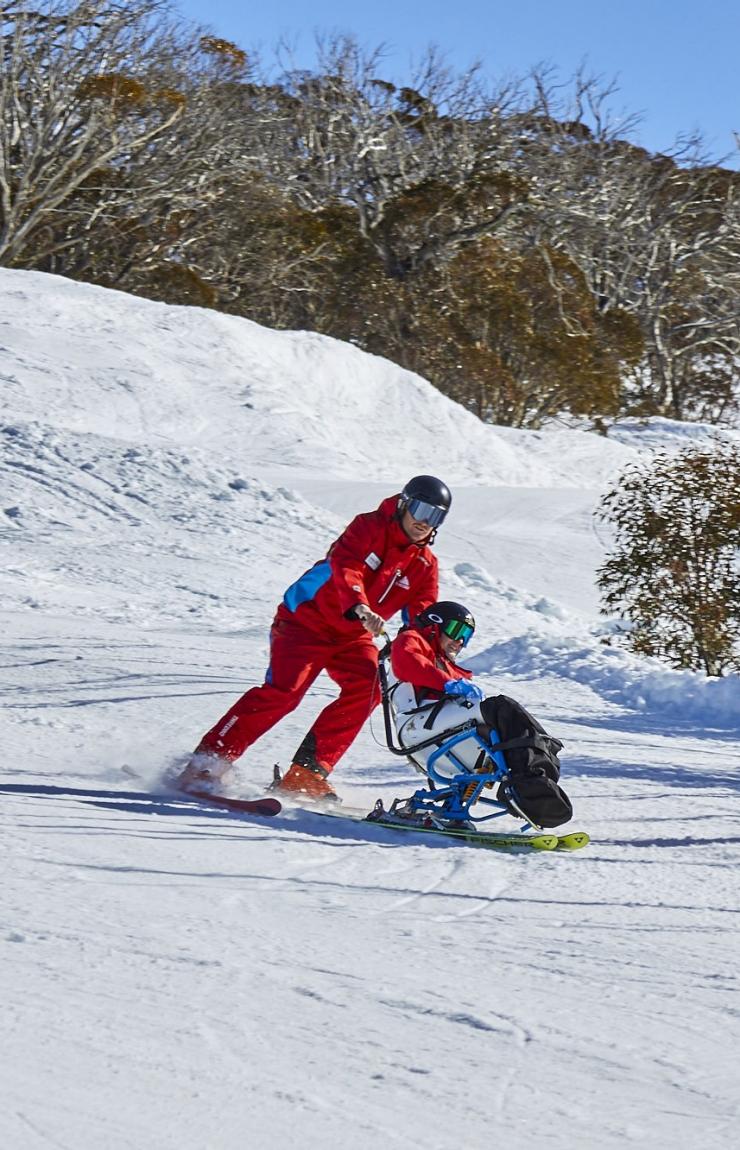
The best ski resorts in Australia

Brisbane / Meeanjin

Rose Byrne’s top 5 Australian destinations

The best Australian cruise destinations

Australia's best train journeys

Sydney / Warrane

The Gold Coast

Darwin / Gulumerrdgen

Hobart / nipaluna

Perth / Boorloo

Adelaide / Tarntanya

Melbourne / Narrm

The best beaches in Australia

Perth's best beaches

The Sunshine Coast

Esperance / Kepa Kurl

Ningaloo / Nyinggulu

Sydney's secret beaches

Private island vacations in Australia

7 luxurious island resorts on the Great Barrier Reef

Moreton Island / Mulgumpin

Heron Island

Rottnest Island / Wadjemup

Romantic getaways in Australia's countryside

6 pubs worth travelling to according to the critics

High Country and King Valley

Australia's best glamping experiences

Australia's best wine regions

Australia's best outback stations and safaris

Mungo National Park

Arnhem Land

Kings Canyon

Broome / Rubibi

Where to meet Australia's cutest animals

The Great Barrier Reef

Australia's pink lakes

Swim with Australia’s most exciting marine life

Australia’s seasonal nature experiences
Top things to do in australia.

Australia’s most unique sporting experiences

Australia’s best girls’ getaways

Accessible ways to experience Australia’s icons

The best places to see wild koalas

Australia’s best natural waterholes

How to forage a feast in Australia

7 family adventure holidays in Australia

Ready for a holiday? Here’s a list of Ruby’s curated Australian adventures picked just for you!

Australia’s most famous natural landmarks

How to have a low-impact holiday on the Great Barrier Reef

Australia’s best outback experiences

Australia's most beautiful islands

How to experience Australia’s wildlife responsibly

Incredible Aboriginal Tours and Experiences

Australia's coolest neighbourhoods

Australia's biggest parties and celebrations

Cultural Attractions of Australia

Where to Buy Aboriginal and Torres Strait Islander Art

A guide to Australian cuisine


The best outback road trips in Australia

9 Adrenaline rushes found only in Australia

10 Mountain bike trails to shred in Tasmania

Road trips and self-drive journeys

Australia's best scenic flights

Guide to family holidays in Australia

Fun family snow experiences in Australia

Incredible Indigenous experiences for families

7 meaningful family holidays to start planning now

Gold Coast theme parks

Australia’s best family-friendly beaches

Life-changing childhood experiences in Australia

Tiny Houses: recharge and reconnect with nature

7 places to ground yourself in nature

9 of the most relaxing holiday destinations in Australia

Luxury experiences found only in Australia

Australian backpacker bucket list

Tips for solo travellers

Best places to live in Australia for working holiday makers

A handy guide to the Australian lifestyle

Things to know about travelling Australia on a budget

How to plan a working holiday

Australia’s best events

Major Events Calendar

12 Australian sports events worth travelling for
Australia’s best food and drink.

Best restaurants in Australia

Australia's bucket list food experiences

Australia’s best seafood experiences

Australian coffee cheat sheet

Australia’s best bars and nightlife

The 10 best modern Australian restaurants

Australia’s native ingredients and where to try them

Typical Aussie foods to try
Ready to plan a trip.

Australian visa and entry requirements FAQs

Accessible travel around Australia
Travellers of all abilities can enjoy australia’s incredible adventures. find resources and tips for your trip down under..
Acknowledgement of Country

We acknowledge the Traditional Aboriginal and Torres Strait Islander Owners of the land, sea and waters of the Australian continent, and recognise their custodianship of culture and Country for over 60,000 years.
- International (English)
- New Zealand (English)
- United States (English)
- Canada (English)
- United Kingdom (English)
- India (English)
- Malaysia (English)
- Indonesia (Bahasa Indonesia)
- Deutschland (Deutsch)
- France (Français)
- Italia (Italiano)
- 中国大陆 (简体中文)
*Product Disclaimer: Tourism Australia is not the owner, operator, advertiser or promoter of the listed products and services. Information on listed products and services, including Covid-safe accreditations, are provided by the third-party operator on their website or as published on Australian Tourism Data Warehouse where applicable. Rates are indicative based on the minimum and maximum available prices of products and services. Please visit the operator’s website for further information. All prices quoted are in Australian dollars (AUD). Tourism Australia makes no representations whatsoever about any other websites which you may access through its websites such as australia.com. Some websites which are linked to the Tourism Australia website are independent from Tourism Australia and are not under the control of Tourism Australia. Tourism Australia does not endorse or accept any responsibility for the use of websites which are owned or operated by third parties and makes no representation or warranty in relation to the standard, class or fitness for purpose of any services, nor does it endorse or in any respect warrant any products or services by virtue of any information, material or content linked from or to this site.
We use cookies on this site to enhance your user experience. Find out more . By clicking any link on this page you are giving your consent for us to set cookies.
Singapore Travel Restrictions
Traveller's COVID-19 vaccination status
Travelling from Australia to Singapore
Open for vaccinated visitors
COVID-19 testing
Not required
Not required for vaccinated visitors
Restaurants
Not required in public spaces.
Ready to travel?
Find flights to singapore, find stays in singapore, explore more countries on travel restrictions map, destinations you can travel to now, netherlands, new zealand, philippines, south korea, united arab emirates, united kingdom, united states, know when to go.
Sign up for email alerts as countries begin to open - choose the destinations you're interested in so you're in the know.
Can I travel to Singapore from Australia?
Most visitors from Australia, regardless of vaccination status, can enter Singapore.
Can I travel to Singapore if I am vaccinated?
Fully vaccinated visitors from Australia can enter Singapore without restrictions.
Can I travel to Singapore without being vaccinated?
Unvaccinated visitors from Australia can enter Singapore without restrictions.
Do I need a COVID test to enter Singapore?
Visitors from Australia are not required to present a negative COVID-19 PCR test or antigen result upon entering Singapore.
Can I travel to Singapore without quarantine?
Travellers from Australia are not required to quarantine.
Do I need to wear a mask in Singapore?
Mask usage in Singapore is not required in public spaces.
Are the restaurants and bars open in Singapore?
Restaurants in Singapore are open. Bars in Singapore are .

Countries, economies and regions
Select a country, economy or region to find embassies, country briefs, economic fact sheets, trade agreements, aid programs, information on sanctions and more.
International relations
Global security.
- Australia and sanctions
- Australian Safeguards and Non-proliferation Office (ASNO)
- Counter-terrorism
- Non-proliferation, disarmament and arms control
- Peacekeeping and peacebuilding
Regional architecture
- Asia Pacific Economic Cooperation (APEC)
- Association of Southeast Asian Nations (ASEAN)
- East Asia Summit (EAS)
- Australia and the Indian Ocean region
- Pacific Islands regional organisations
Global themes
- Child protection
- Climate change
- Cyber affairs and critical technology
- Disability Equity and Rights
- Gender equality
- Human rights
- Indigenous peoples
- People Smuggling, Human Trafficking and Modern Slavery
- Preventing Sexual Exploitation, Abuse and Harassment
- Australia’s treaty-making process
International organisations
- The Commonwealth of Nations
- United Nations (UN)
- World Trade Organization
Foreign Arrangements Scheme
Trade and investment, about free trade agreements (ftas).
- The benefits of FTAs
- How to get free trade agreement tariff cuts
- Look up FTA tariffs and services market access - DFAT FTA Portal
- Discussion paper on potential modernisation – DFAT FTA Portal
About foreign investment
- The benefits of foreign investment
- Investor-state dispute settlement (ISDS)
- Australia's bilateral investment treaties
- Australia's foreign investment policy
For Australian business
- Addressing non-tariff trade barriers
Expo 2025 Osaka, Kansai
Stakeholder engagement.
- Ministerial Council on Trade and Investment
- Trade 2040 Taskforce
- First Nations trade
Australia's free trade agreements (FTAs)
- ASEAN-Australia-New Zealand (AANZFTA)
- Chile (ACLFTA)
- China (ChAFTA)
- Hong Kong ( A-HKFTA & IA)
- India (AI-ECTA)
- Indonesia (IA-CEPA)
- Japan (JAEPA)
- Korea (KAFTA)
- Malaysia (MAFTA)
- New Zealand (ANZCERTA)
- Peru (PAFTA)
- Singapore (SAFTA)
- Thailand (TAFTA)
- United Kingdom (A-UKFTA)
- USA (AUSFTA)
- Trans-Pacific Partnership (TPP)
- European Union (A-EUFTA)
- India (AI-CECA)
- Australia-UAE Comprehensive Economic Partnership Agreement
- Australia-Gulf Cooperation Council (GCC)
Trade and investment data, information and publications
- Fact sheets for countries and regions
- Australia's trade balance
- Trade statistics
- Foreign investment statistics
- Trade and investment publications
- Australia's Trade through Time
WTO, G20, OECD, APEC and IPEF and ITAG
Services and digital trade.
- Service trade policy
- Australia-Singapore Digital Economy Agreement
- Digital trade & the digital economy
Development
Australia’s development program, performance assessment.
- Development evaluation
- Budget and statistical information
Who we work with
- Multilateral organisations
- Non-government organisations (NGOs)
- List of Australian accredited non-government organisations (NGOs)
Development topics
- Development issues
- Development sectors
2030 Agenda for Sustainable Development
- Sustainable Development Goals
Where we deliver our Development Program
Humanitarian action.
Where and how Australia provides emergency assistance.
People-to-people
Australia awards.
- Australia Awards Scholarships
- Australia Awards Fellowships
New Colombo Plan
- Scholarship program
- Mobility program
Public diplomacy
- Australian Cultural Diplomacy Grants Program
- Australia now
- UK/Australia Season 2021-22
Foundations, councils and institutes
- Australia-ASEAN Council
- Australia-India Council
- Australia-Indonesia Institute
- Australia-Japan Foundation
- Australia-Korea Foundation
- Council for Australian-Arab Relations (CAAR)
- Council on Australia Latin America Relations (COALAR)
International Labour Mobility
- Pacific Labour Mobility Scheme
- Agriculture Visa
Australian Volunteers Program
Supporting organisations in developing countries by matching them with skilled Australians.
Sports diplomacy
Australia is a successful global leader and innovator in sport.
A global platform for achievement, innovation, collaboration, and cooperation
About Australia
Australia is a stable, democratic and culturally diverse nation with a highly skilled workforce and one of the strongest performing economies in the world.
Australia in Brief publication
This is the 52nd edition of Australia in Brief, revised and updated in February 2021
Travel advice
To help Australians avoid difficulties overseas, we maintain travel advisories for more than 170 destinations.
- Smartraveller – travel advice
International COVID-19 Vaccination Certificate
Prove your COVID-19 vaccinations when you travel overseas.
- Services Australia
The Australian Passport Office and its agents are committed to providing a secure, efficient and responsive passport service for Australia.
- Australian Passport Office
24-hour consular emergency helpline
- Within Australia: 1300 555 135
- Outside Australia: +61 2 6261 3305
- Getting help overseas
- Visas for Australians travelling overseas
- Visas to visit Australia

- Singapore country brief
- Singapore country/economy fact sheet [PDF]
- Singapore-Australia Green Economy Agreement
Travel information
- Read the travel advice for Singapore
- Subscribe to updates
- Get the right travel insurance
- For how we can help Australians overseas, see the Consular services charter
- Australian Passports Office
- Visa information
Heads of Government
- Includes Heads of State, Prime Ministers, Foreign, Trade and Aid Ministers
Embassies and consulates
- Australian High Commission in Singapore Facebook page
- Australian High Commission in Singapore website
- High Commission for the Republic of Singapore
Trade with Australia
- ASEAN-Australia-New Zealand Free Trade Agreement (AANZFTA)
- Singapore-Australia Free Trade Agreement (SAFTA)
Security Alert May 17, 2024
Worldwide caution.
- Travel Advisories |
- Contact Us |
- MyTravelGov |
Find U.S. Embassies & Consulates
Travel.state.gov, congressional liaison, special issuance agency, u.s. passports, international travel, intercountry adoption, international parental child abduction, records and authentications, popular links, travel advisories, mytravelgov, stay connected, legal resources, legal information, info for u.s. law enforcement, replace or certify documents.
Before You Go
Learn About Your Destination
While Abroad
Emergencies
Share this page:
Travel Advisory September 8, 2023
Australia - level 1: exercise normal precautions.
Reissued with removal of major event information.
Exercise normal precautions in Australia.
Read the country information page for additional information on travel to Australia.
If you decide to travel to Australia:
- Enroll in the Smart Traveler Enrollment Program ( STEP ) to receive Alerts and make it easier to locate you in an emergency.
- Follow the Department of State on Facebook and Twitter .
- Review the Country Security Report for Australia.
- Visit the CDC page for the latest Travel Health Information related to your travel.
- Prepare a contingency plan for emergency situations. Review the Traveler’s Checklist .
Embassy Messages
View Alerts and Messages Archive
Quick Facts
Must be valid at time of entry
One page required for entry stamp
Amounts over AUD 10,000, or equivalent, must be declared
Embassies and Consulates
U.s. consulate general sydney.
Suite 2, 50 Miller Street North Sydney, NSW 2060 Australia Telephone: +(61) (2) 2 8219-2100 Emergency After-Hours Telephone: +(61) (2) 4422-2201 Email: [email protected]
U.S. Embassy Canberra (The Embassy does not provide consular services.) Moonah Place Yarralumla, ACT 2600 Australia Telephone: +(61) (2) 6214-5600 Emergency After-Hours Telephone: +(61) (2) 411-424-608 Fax: +(61) (2) 6214-5970
U.S. Consulate General Melbourne 553 St. Kilda Road Melbourne, VIC 3004 Australia Telephone: +(61) (3) 9526-5900 Emergency After-Hours Telephone: +(61) (3) 9389-3601 Fax: +(61) (3) 9526-5968 Email: [email protected]
U.S. Consulate General Perth 4th Floor 16 St. George's Terrace Perth, WA 6000 Australia Telephone: +(61) (8) 6144-5100 Emergency After-Hours Telephone: +(61) (8) 9476-0081 Fax: +(61) (8) 9325-5914 Email: [email protected]
Destination Description
Learn about the U.S. relationship to countries around the world.
Entry, Exit and Visa Requirements
You must have a valid U.S. passport and a visa or an approved Electronic Travel Authority (ETA) to enter Australia. Most U.S. passport holders traveling to Australia for tourism or business purposes for less than 90 days can obtain an ETA. The ETA is an electronic label-free visa and can be obtained at the ETA website for a small service fee. Airlines and many travel agents in the United States are also able to apply for ETAs on behalf of travelers.
If you overstay your ETA or any other visa, even for short periods, you may be subject to exclusion, detention, and removal by the Australian Department of Home Affairs.
If you are travelling on a valid U.S. ePassport (a passport that contains an electronic chip) and are 16 years of age or older, you are eligible to use Australia’s automated border processing system, SmartGate, upon arrival in Australia (SmartGate kiosks are available only at participating airports). There is no additional enrollment process or fee to use SmartGate. Visit the SmartGate website for more information and for a list of participating airports in Australia.
Visit the Embassy of Australia website for the most current visa information.
HIV/AIDS restrictions. Some HIV/AIDS entry restrictions exist for visitors and foreigners seeking permanent residence in Australia. Depending on the type of visa you apply for, the length of your stay, and your intended activities in Australia, you may be required to undergo a medical examination before the Australian Department of Home Affairs will issue you a visa.
If you are in the application process, and are found to be HIV positive, a decision on the application will be considered on the same grounds as any other pre-existing medical condition (such as tuberculosis or cancer), with the focus on the cost to Australia’s health care and community services.
Additional information about Australian immigration health requirements can be found here.
Please verify this information with the Embassy of Australia in Washington D.C. before you travel.
Find information on dual nationality , prevention of international child abduction and customs regulations on our websites.
Safety and Security
Terrorism: Terrorists have targeted, and could continue to target, Australia.
- Australia has an alert system for possible terrorist attacks. The threat levels range from “not expected” to “certain.” The Australian National Security website has up-to-date information regarding the current terrorism threat level. You may also contact the Australian National Security Hotline at 61-1-800-123-400.
- U.S. citizens in Australia should remain vigilant toward their personal security and exercise caution.
- Australian law protects the right of individuals and groups to engage in peaceful protest and to publicly express their views. Demonstrations and political rallies are generally approved by local authorities and well publicized. However, please be cautious of any possible confrontation that could escalate into violence. You should attempt to avoid the areas of demonstrations and be careful within the vicinity of any demonstrations. You should stay current with media coverage of local events and always be aware of your surroundings.
- You should be aware that robberies, burglaries, assault, and auto theft are common in Australia’s larger cities.
- Foreign visitors in popular tourist areas are targets for pickpockets, purse-snatchers, and petty thieves. Most petty crime can be avoided if basic security precautions are taken.
- Be careful when visiting bars or clubs in the entertainment areas of major cities, as “bar brawls” and other assaults sometimes occur. You should watch out for drink spiking when consuming alcohol with unfamiliar people.
See the Department of State and the FBI pages for information on scams.
Victims of Crime:
- Report crimes to the local police at 000 and contact the U.S. Consulate in your district.
- The local authorities are responsible for investigating and prosecuting crimes.
- See our webpage on help for U.S. victims of crime overseas .
- Assist you in reporting a crime to the police.
- Help you find appropriate medical care.
- Contact relatives or friends with your written consent.
- Explain the local criminal justice process in general terms.
- Provide a list of local attorneys.
- Provide information on victim’s compensation programs in the U.S.
- Provide information about Australian Victim Assistance programs.
- Provide an emergency loan for repatriation to the United States and/or limited medical support in cases of destitution.
- Help you find accommodation and arrange flights home.
- Replace a stolen or lost passport.
Domestic Violence: U.S. citizen victims of domestic violence may contact the U.S. consulate in your district for assistance.
Tourism: The tourism industry is generally regulated, and rules and safety inspections are regularly enforced. Hazardous areas/activities are identified with appropriate signage, and professional staff is typically on hand in support of organized activities. In the event of an injury, appropriate medical treatment is widely available throughout the country. Outside of a major metropolitan center, it may take more time for first responders and medical professionals to stabilize a patient and provide life-saving assistance. U.S. citizens are encouraged to purchase medical evacuation insurance .
Local Laws & Special Circumstances
Criminal Penalties: You are subject to local laws. If you violate local laws, even unknowingly, you may be expelled, arrested, imprisoned or deported.
- It is illegal to take pictures of certain buildings, such as inside certain areas of Australian airports, near prisons, and at military bases.
- Furthermore, some laws are also prosecutable in the United States, regardless of local law. For examples, see our website on crimes against minors abroad and the Department of Justice website.
Alcohol and Drugs:
- Penalties for possession, use, or trafficking of drugs are strict. Convicted offenders can expect lengthy sentences and fines. Please see Australia’s Department of Health webpage for further information.
- Driving under the influence of alcohol can result in jail time.
- Random breath testing of a driver's blood alcohol level is a common occurrence.
Arrest Notification: If you are arrested or detained, ask police or prison officials to notify the U.S. Embassy immediately. See our webpage for further information.
Potential Health Screening: Australian authorities have broad powers to prevent the entry of diseases and other materials into Australia that might pose a threat to its welfare. In the event of a public health emergency involving a communicable disease, passengers arriving in Australia may be subject to strict health screening measures, including testing, monitoring, and assessment for possible quarantine.
Customs: Australian customs authorities enforce very strict regulations concerning the importation from all countries of items such as agricultural goods, including plants and food products, and wood products, as well as very strict quarantine standards for animals and pets. Can you bring it in?
Contact the Embassy of Australia in Washington, D.C., or one of Australia's consulates in the United States for specific information regarding customs requirements, and visit the Australian Government’s Department of Agriculture website for additional information.
Natural Disasters:
Australia experiences a range of natural disasters, including bushfires, floods, and severe storms. These events are difficult to predict and can result in loss of life. You should be aware of conditions around you and monitor local weather and safety reports so you can take appropriate action when needed.
See our webpage for information on storm preparedness and response.
Safety Concerns:
Outdoor Recreation/Adventure
- Be aware that Australian fauna can be dangerous. From jellyfish to crocodiles, sharks, poisonous insects, and snakes, the continent and its waters host wildlife that merit awe and respect in equal doses.
- Visit the Wet Tropics Management Authority visitor information guide for information on Australian wildlife and marine life.
- Take important safety precautions when swimming, such as swimming only between the flags where a lifeguard is present, and never swimming alone.
- Further information on beach safety can be found on the Surf Life Saving website.
Follow recommended precautions when snorkeling and scuba diving and never dive alone. Over the past few years, there have been numerous deaths related to snorkeling and scuba diving incidents.
Faith-Based Travelers : See the following webpages for details:
- Faith-Based Travel Information
- International Religious Freedom Report – see country reports
- Human Rights Report – see country reports
- Hajj Fact Sheet for Travelers
- Best Practices for Volunteering Abroad
LGBTI Travelers: There are no legal restrictions on same-sex sexual relations or the organization of LGBTI events in Australia. Australian federal law prohibits discrimination based on sexual orientation.
As of December 9, 2017 Australia defines marriage as “the union between two people.” Australia grants temporary and permanent visas to same-sex partners of Australian citizens.
See our LGBTI Travel Information page and section 6 of our Human Rights report for further details.
Travelers Who Require Accessibility Assistance
- Australia enforces laws prohibiting discrimination against access to premises, facilities, and accommodation.
- Many of the downtown areas of Australian cities were built in the 1800s. These areas often have narrow sidewalks crowded with pedestrians and tourists.
- Most public transit, parking, streets, and buildings are accessible for disabled travelers.
- Tourist spots at the beach or in the Australian outback can have varying degrees of accessibility.
- Many accommodations and venues provide accessibility information on their websites.
Students: See our Students Abroad page and FBI travel tips .
Women Travelers: See our travel tips for Women Travelers .
For emergency services in Australia, dial 000.
Ambulance services are widely available.
We do not pay medical bills. Be aware that U.S. Medicare/Medicaid does not apply overseas. Most hospitals and doctors overseas do not accept U.S. health insurance.
- Excellent medical care is available in Australia.
- Doctors and hospitals often expect immediate cash payment for health services.
- Serious medical problems requiring hospitalization and/or medical evacuation to the United States can cost hundreds of thousands of dollars.
Medical Insurance: Make sure your health insurance plan provides coverage overseas. Most care providers overseas only accept cash payments. See our webpage for more information on overseas insurance coverage. Visit the U.S. Centers for Disease Control and Prevention for more information on type of insurance you should consider before you travel overseas.
Prescriptions:
- If traveling with prescription medication, check with the government of Australia to ensure the medication is legal in Australia .
- Always, carry your prescription medication in original packaging with your doctor’s prescription
Vaccinations: Be up-to-date on all vaccinations recommended by the U.S. Centers for Disease Control and Prevention.
Further health information:
- World Health Organization
- U.S. Centers for Disease Control and Prevention (CDC)
Air Quality: Visit AirNow Department of State for information on air quality at U.S. Embassies and Consulates.
The U.S. Embassy maintains a list of hospitals and a link to the Australian National Health Services Directory at Medical Assistance - U.S. Embassy & Consulates in Australia (usembassy.gov) . We do not endorse or recommend any specific medical provider or clinic.
Medical Tourism and Elective Surgery
- Visit the U.S. Centers for Disease Control and Prevention website for information on Medical Tourism, the risks of medical tourism, and what you can do to prepare before traveling to Australia.
Pharmaceuticals:
- U.S. Customs and Border Protection and the Food and Drug Administration are responsible for rules governing the transport of medication back to the United States. Medication purchased abroad must meet their requirements to be legally brought back into the United States. Medication should be for personal use and must be approved for usage in the United States. Please visit the U.S. Customs and Border Protection and the Food and Drug Administration websites for more information.
Adventure Travel
- Visit the U.S. Centers for Disease Control and Prevention website for more information about Adventure Travel .
Air Quality
Air pollution is a significant problem during certain months in Australia due to bush fires. Consider the impact seasonal bush fire season pollution may have on your health and consult your doctor before traveling.
The air quality varies considerably and changes with the season. It is typically at its worst in the bush fire season. People at the greatest risk from particle pollution exposure include:
- Infants, children, and teens
- People over 65 years of age
- People with lung disease such as asthma and chronic obstructive pulmonary disease (COPD), which includes chronic bronchitis and emphysema;
- People with heart disease or diabetes
- People who work or are active outdoors
Travel and Transportation
Road Conditions and Safety:
- Traffic operates on the left side of the road, and all vehicles use right-hand drive.
- Use caution when crossing streets and when driving.
- When crossing roads on foot, make sure you look carefully in all directions.
- Seat belt use by drivers and all passengers is mandatory, and fines apply for not wearing them.
- Motorcyclists must wear helmets.
- Speed limits and laws are rigorously enforced. Speed limits vary throughout Australia and are measured in kilometers, not miles. Be aware that speed cameras are everywhere and you will be ticketed for driving over the speed limit.
- Roads and streets are frequently narrower and less graded than U.S. highways.
- Outside major metropolitan areas, most highways are two-lane roads with significant distances between destinations.
- When driving in Australia, exercise caution while passing or merging with adjacent traffic.
- If driving in rural areas, be alert to free-roaming animals, such as kangaroos, and "road-trains" (several semi-truck trailers connected together).
- Passing road-trains is dangerous, and you should pull over to allow on-coming road-trains to pass to avoid being sideswiped.
- If you have no experience with a 4-wheel drive vehicle, you should exercise common-sense when driving in the Australian outback.
Traffic Laws:
- Each state/territory has different rules about using a foreign driver’s license and the conditions under which a visitor might have to get an international driver’s license. More information about driving rules and regulations is available by state .
- Texting or holding your phone while driving is against the law in Australia, but you can use a hands-free system to communicate while driving.
- For specific information concerning Australian driving permits, vehicle inspection, road tax, mandatory insurance, and the rental and operation of motor vehicles in Australia, visit the Australian Tourist Commission website.
Public Transportation: Australia has an extensive and safe public transportation network consisting of buses, streetcars, ferries, trains, and subways. Metered taxis and ride sharing services are also prevalent. Use common sense safety practices, such as guarding valuables and remaining aware of your surroundings, on all public transportation.
See our Road Safety page for more information.
Aviation Safety Oversight: The U.S. Federal Aviation Administration (FAA) has assessed the government of Australia’s Civil Aviation Authority as being in compliance with International Civil Aviation Organization (ICAO) aviation safety standards for oversight of Australia’s air carrier operations. Further information may be found on the FAA’s safety assessment page .
Maritime Travel: Mariners planning travel to Australia should also check for U.S. maritime advisories and alerts . Information may also be posted to the U.S. Coast Guard homeport website , and the NGA broadcast warnings website portal select “broadcast warnings”.
For additional travel information
- Enroll in the Smart Traveler Enrollment Program (STEP) to receive security messages and make it easier to locate you in an emergency.
- Call us in Washington, D.C. at 1-888-407-4747 (toll-free in the United States and Canada) or 1-202-501-4444 (from all other countries) from 8:00 a.m. to 8:00 p.m., Eastern Standard Time, Monday through Friday (except U.S. federal holidays).
- See the State Department’s travel website for the Worldwide Caution and Travel Advisories .
- Follow us on X (formerly known as "Twitter") and Facebook .
- See traveling safely abroad for useful travel tips.
Review information about International Parental Child Abduction in Australia . For additional IPCA-related information, please see the International Child Abduction Prevention and Return Act ( ICAPRA ) report.
Travel Advisory Levels
Assistance for u.s. citizens, australia map, learn about your destination, enroll in step.

Subscribe to get up-to-date safety and security information and help us reach you in an emergency abroad.
Recommended Web Browsers: Microsoft Edge or Google Chrome.
Make two copies of all of your travel documents in case of emergency, and leave one with a trusted friend or relative.
Afghanistan
Antigua and Barbuda
Bonaire, Sint Eustatius, and Saba
Bosnia and Herzegovina
British Virgin Islands
Burkina Faso
Burma (Myanmar)
Cayman Islands
Central African Republic
Cote d Ivoire
Curaçao
Czech Republic
Democratic Republic of the Congo
Dominican Republic
El Salvador
Equatorial Guinea
Eswatini (Swaziland)
Falkland Islands
France (includes Monaco)
French Guiana
French Polynesia
French West Indies
Guadeloupe, Martinique, Saint Martin, and Saint Barthélemy (French West Indies)
Guinea-Bissau
Isle of Man
Israel, The West Bank and Gaza
Liechtenstein
Marshall Islands
Netherlands
New Caledonia
New Zealand
North Korea (Democratic People's Republic of Korea)
Papua New Guinea
Philippines
Republic of North Macedonia
Republic of the Congo
Saint Kitts and Nevis
Saint Lucia
Saint Vincent and the Grenadines
Sao Tome and Principe
Saudi Arabia
Sierra Leone
Sint Maarten
Solomon Islands
South Africa
South Korea
South Sudan
Switzerland
The Bahamas
Timor-Leste
Trinidad and Tobago
Turkmenistan
Turks and Caicos Islands
United Arab Emirates
United Kingdom
Vatican City (Holy See)
External Link
You are about to leave travel.state.gov for an external website that is not maintained by the U.S. Department of State.
Links to external websites are provided as a convenience and should not be construed as an endorsement by the U.S. Department of State of the views or products contained therein. If you wish to remain on travel.state.gov, click the "cancel" message.
You are about to visit:
Australia To Singapore Travel Restrictions: What You Need To Know
- Last updated Aug 13, 2023
- Difficulty Intemediate
- Category United States
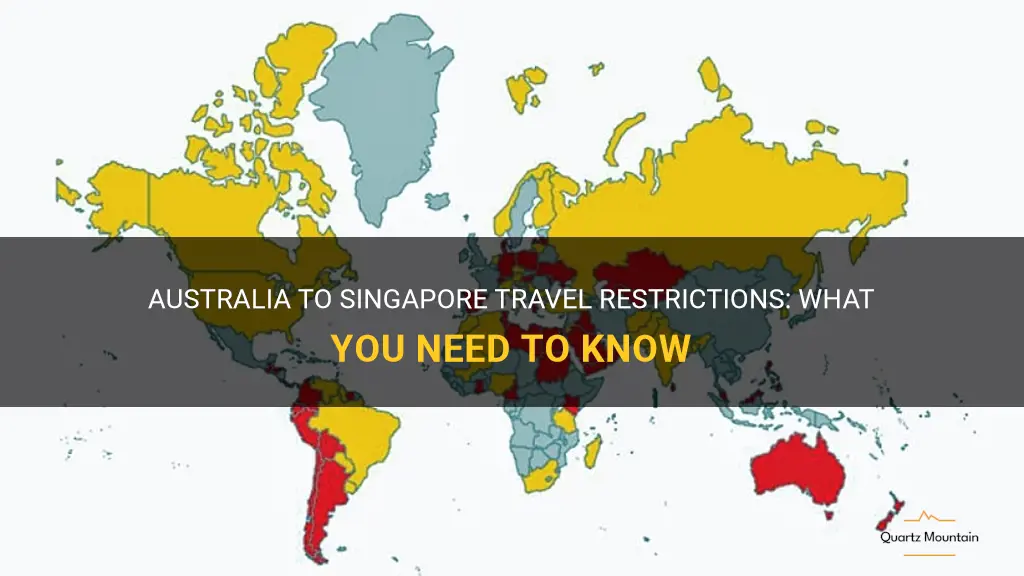
Australia and Singapore, two vibrant and multicultural nations, have long enjoyed a strong friendship and economic ties. However, recent travel restrictions have posed challenges for those wishing to visit or move between the two countries. With the global COVID-19 pandemic still a concern, governments have implemented measures to protect their citizens and prevent the spread of the virus. In this article, we will delve into the current travel restrictions from Australia to Singapore, exploring the impact on individuals, businesses, and the overall relationship between these two nations.
What You'll Learn
What are the current travel restrictions for individuals traveling from australia to singapore, are there any quarantine requirements for travelers from australia to singapore, are there any specific entry requirements or documents needed for australians traveling to singapore, are there any exceptions for essential or emergency travel from australia to singapore, are these travel restrictions subject to change, and if so, where can the latest updates be found.

As the COVID-19 pandemic continues to affect travel worldwide, it is essential to stay updated on the current travel restrictions and guidelines. This article aims to provide information about the current travel restrictions for individuals traveling from Australia to Singapore.
Singapore has implemented various measures to control the spread of the virus, including travel restrictions and mandatory quarantine requirements. The travel restrictions can change at any time, so it is crucial to check for the latest information before planning any travel.
At present, individuals traveling from Australia to Singapore must adhere to the following travel restrictions:
- Pre-Departure Measures: Before traveling, individuals must undergo a COVID-19 PCR test within 72 hours of their departure. The test must be conducted at an accredited laboratory or medical institution. Travelers are required to obtain a negative test result certificate as proof of a negative test.
- Air Travel Pass (ATP): All travelers, including Singapore citizens, permanent residents, and long-term pass holders, must apply for an Air Travel Pass (ATP) before departure. The ATP is a mandatory document required for entry into Singapore. Travelers can apply for the ATP online, and approval must be obtained before traveling.
- Health Declaration and Insurance: Travelers must complete a Health Declaration online before their arrival in Singapore. They must also ensure they have valid travel insurance with coverage for COVID-19 medical treatment and hospitalization costs in Singapore.
- Stay-Home Notice (SHN): Upon arrival in Singapore, all travelers must serve a 14-day Stay-Home Notice (SHN). During the SHN period, individuals are not allowed to leave their place of residence. However, individuals may opt for a COVID-19 test on the 6th or 7th day of their SHN, and if the test is negative, they can be released from isolation.
- COVID-19 Testing on Arrival: Travelers may be selected for a COVID-19 test upon arrival at Singapore's airport. The test is mandatory, and individuals must bear the cost of the test.
It is essential to note that these restrictions and requirements may change frequently based on new developments and the prevailing global COVID-19 situation. Travelers are advised to check the official websites of the Singapore Ministry of Health and the Immigration and Checkpoints Authority for the most up-to-date information.
Before planning any travel, individuals should also consider the current situation in Australia and the possibility of further travel restrictions or quarantine requirements upon their return. It is advisable to consult with airlines, travel agents, and relevant government agencies to understand the complete travel procedures and requirements.
Staying informed and following the necessary precautions will help ensure a smoother and safer travel experience for individuals traveling from Australia to Singapore.
Exploring Michigan: Understanding the Current Travel Restrictions before Planning Your Trip
You may want to see also
As the global pandemic continues, travel restrictions and quarantine requirements have become necessary measures to control the spread of the virus. For travelers from Australia to Singapore, there are specific quarantine requirements in place to ensure the safety and well-being of both residents and visitors.
Currently, travelers from Australia are allowed to enter Singapore without the need for quarantine, provided certain conditions are met. These conditions include:
- Pre-Departure Measures: Before traveling to Singapore, visitors from Australia must take a pre-departure COVID-19 Polymerase Chain Reaction (PCR) test within 72 hours before their scheduled departure. The test must be conducted at a recognized and accredited laboratory.
- Travel Declaration and Health Declaration: Travelers must submit their health and travel history electronically via the SG Arrival Card. This can be done through the online submission system, available on the Singapore Immigration and Checkpoints Authority (ICA) website or mobile application.
- TraceTogether App: Visitors are required to download and register for the TraceTogether mobile application. This app helps with contact tracing efforts in Singapore, should there be any COVID-19 cases linked to the traveler's activities.
Upon arrival in Singapore, there are no quarantine requirements for travelers from Australia who meet these conditions. However, it is important to note that the situation may change at any time as a response to the evolving nature of the pandemic. Therefore, it is essential to stay updated on the latest travel advisories and guidelines provided by the Singaporean authorities.
It is also worth mentioning that while no quarantine is required, travelers may still be subject to health screenings and temperature checks at the airport or other entry points. Any individual showing symptoms of COVID-19 may be subject to further testing, isolation, or medical attention as determined by the local health authorities.
In addition to the travel requirements, visitors are advised to take necessary precautions to protect themselves and others from the virus. This includes practicing good personal hygiene, wearing a mask in public areas, and maintaining safe distancing measures. Singapore also has strict regulations in place for public health and safety, and non-compliance can lead to fines and penalties.
As the situation remains fluid, it is crucial for travelers from Australia to stay updated on any changes to the quarantine requirements or travel restrictions. It is recommended to consult official government websites, such as the Singapore Ministry of Health and the Australia Department of Foreign Affairs and Trade, for the latest information before planning any travel. By staying informed and adhering to the guidelines, travelers can help ensure a safe and smooth journey to Singapore.
Navigating the European Travel Liquid Restrictions: What You Need to Know
If you are an Australian planning to travel to Singapore, you may be wondering what entry requirements and documents you need to prepare. Singapore is a popular travel destination known for its vibrant city life, diverse culture, and stunning attractions. To ensure a smooth and hassle-free trip, it's essential to familiarize yourself with the entry requirements and necessary documents. Here's what you need to know:
Passport Validity:
First and foremost, your passport should be valid for at least six months beyond your intended departure date from Singapore. If your passport is close to expiration, it's advisable to renew it before traveling.
Visa Requirements:
Fortunately, Australian passport holders do not require a visa to enter Singapore for tourism or business purposes. You will be granted a visa-free stay for up to 90 days upon arrival. However, if you plan to work, study, or reside in Singapore for an extended period, you will need to apply for the appropriate visa.
Proof of Return or Onward Travel:
It is advisable to carry a copy of your flight itinerary that shows your return or onward travel plans. Singapore Immigration may request this information upon entry, so having it readily available can help expedite the entry process.
Proof of Accommodation:
Singapore Immigration may also ask for proof of your accommodation during your stay. It is recommended to have a hotel reservation or booking confirmation readily available. If you plan to stay with friends or relatives, it would be helpful to have a letter of invitation or address details.
Sufficient Funds:
To ensure you can support yourself financially during your stay, it is advisable to carry sufficient funds or a valid credit card. While there is no specified minimum amount, having evidence of financial means may help if immigration officials request it.
COVID-19 Regulations:
Due to the ongoing COVID-19 pandemic, additional entry requirements and health regulations may be in place. It is crucial to stay updated with the latest information from the Singaporean government and your airline regarding any COVID-19 travel restrictions, quarantine measures, or pre-departure testing requirements.
Travel Insurance:
Although not mandatory, it is highly recommended to have travel insurance when traveling to any destination, including Singapore. Travel insurance can provide coverage for medical emergencies, trip cancellations, or lost belongings, offering you peace of mind during your trip.
While this information is accurate at the time of writing, entry requirements can change without prior notice. Therefore, it is always advisable to check the official website of the Singaporean Immigration and Checkpoints Authority or consult with the nearest Singaporean embassy or consulate to ensure you have the most up-to-date information before traveling. By being prepared and having the necessary documents ready, you can enjoy your trip to Singapore with ease.
Exploring Paradise: Unveiling the Travel Restrictions to Key West
As the COVID-19 pandemic continues to affect travel around the world, many countries have implemented strict border control measures to prevent the spread of the virus. Australia and Singapore are no exception to these measures, and both countries have imposed travel restrictions to protect their citizens. However, there are some exceptions for essential or emergency travel from Australia to Singapore.
The Singaporean government has implemented a system called the Safe Travel Pass (STP) for travelers from selected countries, including Australia. Under this system, certain categories of travelers are allowed to enter Singapore for essential or emergency purposes. These categories include:
- Essential business and official travel: This category allows individuals who have urgent business or official matters in Singapore to enter the country. These travelers are required to obtain prior approval from the relevant Singapore government agency or department.
- International students: Singapore has also allowed international students, including those from Australia, to enter the country for their studies. However, strict health and safety protocols are in place, and students are required to adhere to these measures upon arrival.
- Permanent residents and long-term pass holders: Singaporean permanent residents and long-term pass holders, such as work or study permit holders, are allowed to return to Singapore. They may be subject to additional testing and quarantine measures upon arrival.
- Singapore citizens and their immediate family members: Singaporean citizens and their immediate family members are also allowed to enter Singapore. However, they may be subject to health screenings and quarantine requirements.
It is important to note that even if travelers fall into one of the above categories, they will still need to comply with all the necessary health and safety measures imposed by both the Australian and Singaporean governments. These measures may include pre-departure COVID-19 testing, quarantine upon arrival, and the use of contact tracing apps.
It is always advisable to check with the relevant authorities, such as the Singaporean Embassy or Consulate in Australia, for the most up-to-date information on travel restrictions and requirements. These measures are subject to change based on the prevailing situation of the pandemic.
In conclusion, while there are exceptions for essential or emergency travel from Australia to Singapore, these exceptions are limited to certain categories of travelers. Strict health and safety protocols are in place for all travelers, and it is important to stay informed and comply with the requirements laid out by both countries to ensure a safe and secure journey.
Update on European Travel Restrictions from the US: What You Need to Know
Travel restrictions have become a common part of our lives in recent times, and it's essential to stay updated on any changes or updates to these restrictions. The ever-evolving nature of the COVID-19 pandemic means that travel restrictions are subject to change, and it's crucial to know where to find the latest updates.
Travel restrictions may vary from one country to another, and even within different regions of the same country. They can include requirements such as quarantine periods, COVID-19 testing, or even complete bans on travel to or from certain areas.
To stay informed about the latest travel restrictions, it's recommended to regularly check official sources such as government websites and embassies. These sources typically provide up-to-date information regarding travel advisories and restrictions.
Government websites are often the most reliable source for accurate information on travel restrictions. They provide official updates and advice from health authorities and government agencies. These websites can provide detailed information on entry requirements, quarantine protocols, and any specific restrictions for travelers.
Embassies or consulates of your home country in the destination country can also be an excellent source of information. They often have dedicated sections on their websites providing guidance for their citizens traveling abroad. The information provided by embassies is generally reliable and customized for the needs of their citizens.
Another useful resource is the International Air Transport Association (IATA) website. IATA has a comprehensive database of travel restrictions and requirements for different countries. The website allows you to search for specific countries and provides detailed information on entry requirements, quarantine rules, and any additional restrictions.
In addition to official sources, it can also be helpful to subscribe to email or text alerts from reputable travel advisories or news outlets. These alerts can notify you of any significant changes or updates to travel restrictions.
It's important to remember that travel restrictions can change rapidly, sometimes with little notice. Therefore, it's advisable to check for updates just before making any travel plans to ensure you have the most accurate and current information.
In conclusion, travel restrictions are subject to change, and it's crucial to stay informed about the latest updates. Official government websites, embassy websites, and the IATA website are reliable sources of up-to-date information. Subscribing to alerts from reputable travel advisories or news outlets can also help you stay informed. Stay vigilant and check for updates before making any travel plans.
Navigating the Travel Restrictions to Ohio: What You Need to Know
Frequently asked questions.
As of now, travelers from Australia are not allowed to enter Singapore unless they have received special approval from immigration authorities. This restriction is in place due to the ongoing COVID-19 pandemic.
To receive special approval, you will need to apply for an entry visa through the Immigration and Checkpoints Authority of Singapore (ICA). The ICA will review your application and determine if you meet the necessary criteria, such as being an essential worker or having urgent medical needs.
Yes, even if you are granted special approval to enter Singapore, you will be required to undergo a mandatory 14-day quarantine period at a designated facility. The cost of accommodation and other expenses during the quarantine period will be borne by the traveler.
Yes, there are some exceptions to the entry restrictions. Singapore citizens, permanent residents, and long-term pass holders, such as work pass holders and student pass holders, are generally allowed to enter the country. However, they may still be subject to quarantine and other health measures upon arrival. It is advisable to check with the relevant authorities or your airline for the latest information and requirements.

- Elani Piper Author Editor Reviewer

- Merve Nussman Author Reviewer Traveller
It is awesome. Thank you for your feedback!
We are sorry. Plesae let us know what went wrong?
We will update our content. Thank you for your feedback!
Leave a comment
United states photos, related posts.

10 Cheap and Fun Things to Do in Little Rock
- Jul 20, 2023

Essential Items to Pack for HOSA Competitions
- Jan 11, 2024

Essential Items to Pack for an Unforgettable Wine Tour
- Dec 28, 2023

Essential Items to Pack for a Trip to Shenandoah National Park
- Jan 22, 2024

12 Epic Things to Do in 7 Days to Die
- Jun 06, 2023

Essential Items to Pack for Your Memorable Babymoon
- Jan 01, 2024

Singapore Changi Airport
Is the Singapore visa free for Australians?
Goh Jun Cheng
October 12, 2023
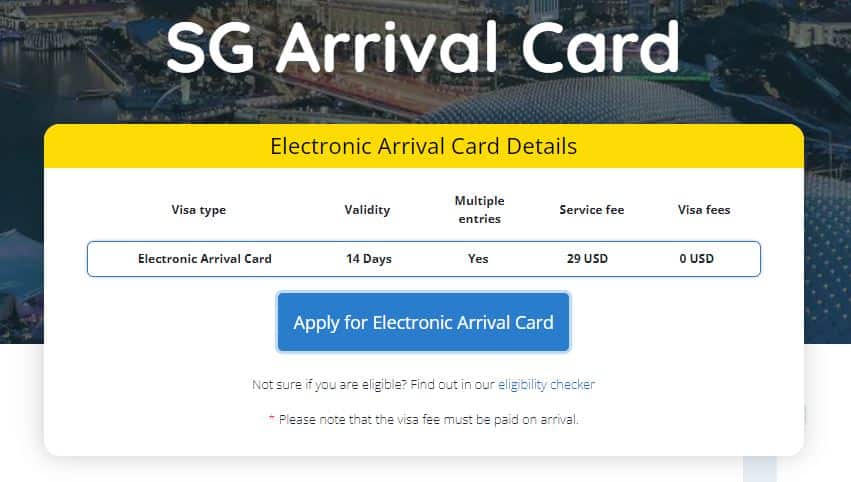
Table of Contents
Overview of Visa Requirements for Australians Traveling to Singapore
Singapore and Australia have a special relationship that allows for visa-free travel between the two countries for tourists and business visitors. This makes travel between these two Pacific nations incredibly easy and hassle-free.
In this blog post, we’ll take an in-depth look at the visa requirements, or lack thereof, for Australian citizens traveling to Singapore as tourists or for business purposes.
Visa Not Required for Australians on Short Trips to Singapore
One of the biggest benefits of the close ties between Singapore and Australia is that Australians do not need to obtain a visa if they are visiting Singapore for less than 30 days [1]. This applies only for tourism and business trips – not for employment or studies.
Some key points about the visa waiver for Australians:
- It allows for visa-free entry to Singapore for up to 30 days.
- It is valid for tourism, social visits, and business trips only. Australians cannot work in Singapore without a proper work visa.
- To qualify, travelers must have an Australian passport that is valid for at least 6 months.
- Visitors must have an onward or return ticket to exit Singapore within the 30 day period.
So in summary, short tourist or business trips to Singapore are easy and hassle-free for Australian passport holders!
What Counts as a Short Trip?
According to Singapore’s immigration laws, a “short trip” for visa-free entry is defined as up to 30 days from the date of entry [1].
Some key things to keep in mind:
- The 30 days applies to the total time spent in Singapore, not just from the original date of entry. For example, if you visited for 5 days, left for a week, then returned for another 5 days, that would count as 10 days out of the 30 day maximum.
- Extensions are not possible. If you want to stay longer than 30 consecutive days, you must apply for a proper visa before traveling.
- The 30 day concession can generally only be used once every 3 months. Frequent visits within a short timeframe may raise suspicions and get denied entry.
So if you want to enjoy visa-free travel to Singapore, be sure to limit your trips to less than a month and space them out by a few months in between.
Longer Trips Require a Visa for Australians
While short tourist and business trips are easy, Australians traveling to Singapore for purposes other than tourism or business, or staying longer than 30 days, must obtain a proper Singapore visa in advance [2].
Some examples include:
- Employment – This requires at least an employment pass or work permit. Working under a tourist visa exemption is illegal.
- Education – Studying for more than 30 days requires a Student’s Pass.
- Long-term stays – Anything beyond 30 days needs a long-term visit pass.
- Permanent migration – This requires extensive documentation and approval before migrating to live long-term in Singapore.
So in summary, the 30 day visa waiver only applies to brief tourism and business trips. Those looking to work, study, or live long-term in Singapore need to apply for the appropriate long-term passes and visas.
Do Australians Need an Onward Ticket?
One requirement for visa-free entry under the Australian passport concession is proof of onward travel out of Singapore within 30 days. This is also commonly referred to as an onward or return ticket.
Australia citizens will need to show their airline ticket or itinerary at immigration to prove they have booked travel to exit Singapore within 30 days [3]. Otherwise, entry may be denied.
Some key points about the onward travel requirement:
- The return ticket can be to any onward destination – it doesn’t have to be back to Australia.
- However, the travel dates must be within 30 days of the date of entry into Singapore.
- This applies even if you have plans to exit Singapore by other modes of transport – air travel proof is still required.
- Having an open-ended ticket without fixed dates generally does not qualify. Immigration officials may ask to see a fixed itinerary.
In summary, Australians entering Singapore under the short-term visa waiver must have an onward ticket booked within 30 days as proof they will exit by the deadline. This avoids overstaying illegally past the allowed period.
What Else Do Australians Need to Enter Singapore Visa-Free?
Aside from having a valid Australian passport and onward travel plans, there are a few other requirements Australians must meet to enter Singapore without a visa [4]:
- Passport validity – Passports must have at least 6 months validity left for entry into Singapore. Anything expiring sooner may be denied entry.
- Sufficient funds – You may need to provide proof of adequate funds to sustain yourself and pay for accommodations during your stay in Singapore.
- Onward destination requirements – Ensure your onward destination after Singapore does not require any special visas or documentation from you.
- Clean immigration record – Previous immigration offenses could result in entry being denied to Singapore.
- Intent of visit – Be prepared to explain your reason for visit if asked ( tourism, business, etc).
- Return ticket home – You may also need to show a ticket departing Singapore back to Australia eventually.
As long as these requirements are met, Australians can enter Singapore fuss-free without applying for a visa!
Can Australians Enter Singapore Through Other Channels?
Aside from air travel through Singapore Changi Airport, Australian citizens can also enter Singapore visa-free through the following modes of transport [5]:
- Land crossings – Travel over land by bus or train through Malaysia. The entry point would be the Singapore-Malaysia Causeway or Second Link.
- Sea ports – Arrival through sea ports and ferry terminals. This includes the Singapore Cruise Centre as well as regional ports at Tanah Merah, Pasir Panjang, and Jurong.
Rules are generally the same – Australians are granted 30 days visa-free entry at all official ports. Travel documents and onward tickets will still be checked thoroughly.
The visa waiver does not apply if traveling directly from Indonesia – in that case a visa application will be required before departure.
Can Australians Extend Their Visa-Free Stay?
A common question from Australian visitors is whether they can extend their short 30-day visa waiver to stay longer in Singapore.
Unfortunately, it is not possible to extend your visa-free stay as an Australian citizen once you are already in Singapore [6]. The standard concession is strictly 30 days only.
Here are the options if you wish to stay longer:
- Exit and re-enter – As mentioned earlier, it may be possible to do a visa run to Johor Bahru in Malaysia before flying back in to Singapore to reset the 30 day counter. However, this strategy is frowned upon by immigration officials if done too frequently.
- Apply for proper visa – Your only other legal option is to apply for the correct long-term visa for your purpose (employment, residency, etc) through the proper channels, before your visa-free entry period ends. This often requires extensive paperwork and processing time of 4-6 weeks or longer.
So in essence, the 30 days cannot be extended within Singapore itself – the only way is to exit and re-enter, or apply for a long-term visa from your home country well in advance.
Australian passport holders enjoy the privilege of visa-free entry into Singapore for tourism or business trips of up to 30 days. This provides excellent ease of travel between the two countries.
However, those looking to work, study or live in Singapore long-term will still need to apply in advance for the appropriate visas before traveling.
The key requirements to remember are having 6 months passport validity, onward travel booked within 30 days, proof of funds, and not having immigration offenses.
- https://www.ica.gov.sg/enter-depart/entry_requirements/visa_requirements
- https://www.mom.gov.sg/passes-and-permits
- https://www.ica.gov.sg/enter-depart/entry_requirements/visa_requirements/visa-free-transit-facility
- https://www.dfa.ie/travel/travel-advice/a-z-list-of-countries/singapore/
- https://www.straitstimes.com/singapore/transport/land-sea- checkpoints-can-now-accept-ic-for-visa-free-entry-to-s-pore
- https://www.ica.gov.sg/enter-depart/extend

Goh Jun Cheng is the chief staff writer for SingaporeAirport.com. Jun Cheng graduated with a degree in journalism from Nanyang Technological University in Singapore.
He has over 5 years of experience writing about aviation, tourism, and lifestyle topics relevant to locals and visitors in Singapore. His articles provide insights into the rich culture, cuisine, and attractions of Singapore. Jun Cheng is an avid traveler who has visited over 15 countries.
When he is not writing or traveling, he enjoys photography, trying new foods, and hiking. As a longtime Singapore resident, Jun Cheng is passionate about sharing hidden gems and perspectives about his home country.
Leave a Comment Cancel reply
Save my name, email, and website in this browser for the next time I comment.
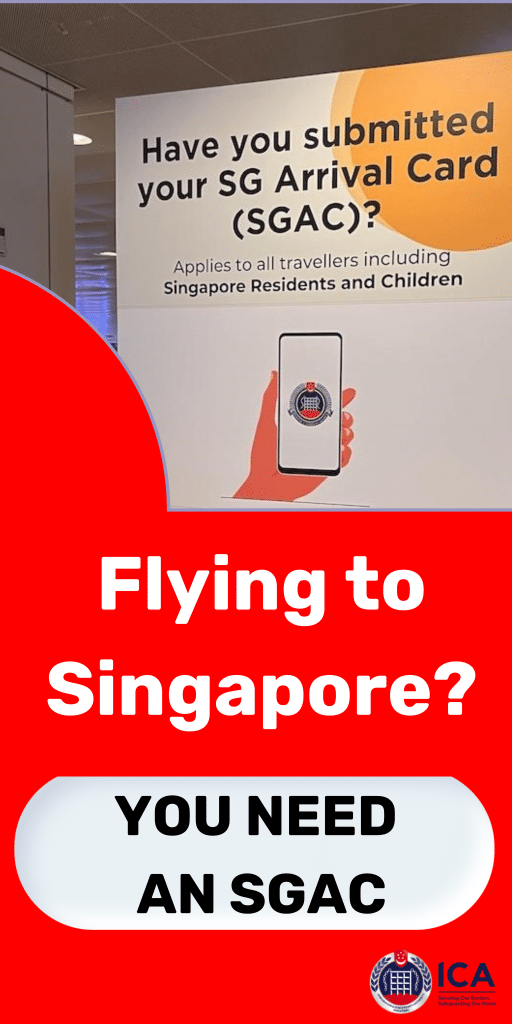
most recent

SG Arrival Card (Singapore e visa) Guide: Everything you need to know

Guía de la tarjeta de llegada SG (visado electrónico de Singapur): Todo lo que necesita saber
Discount singapore tourist sim cards available for changi airport pickup, is the singapore visa free for tunisian citizens, is the singapore visa free for sudanese citizens.
© 2024 SINGAPORE AIRPORT
Australia to join US Global Entry program to cut travellers' airport wait times
Australian travellers will soon have access to the US' Global Entry and TSA PreCheck programs, which speed up customs and security clearances at American airports.
Foreign Minister Penny Wong says the necessary legislation will be introduced in the Australian parliament next year.
What's next?
From January, 1,000 frequent travellers will be able to apply, but the government says there are plans to expand eligibility later in 2025.
Australians will become eligible for easier passage through American airports with participation in the US Global Entry program set to begin early next year.
The program allows pre-approved, low-risk travellers from selected countries to use automated kiosks to speed up their processing times upon landing in the US.
They'll also get access to faster security screening for domestic flights.
American citizens can already use self-service "SmartGates" at Australian airports, but a plan to open up Global Entry to Australians stalled after being first flagged in 2018.
"It's good for Australian businesses, and it's good for our friendship," said Foreign Minister Penny Wong, who made the announcement in Washington DC.
"This program and our participation in it is a sign of our closeness and our trust."
A two-step process
Australia's participation in the Global Entry program will occur in two stages, with 1,000 frequent travellers able to apply from January 2025.
They'll need to have travelled to the US at least five times in the previous 12 months.
However, that requirement will be lifted when phase two begins and the number of Australians able to enrol becomes unlimited.
That second, expanded stage will require legislation to be passed through the Australian parliament, and is expected to begin "later" in 2025.
Australians approved for Global Entry will skip the general lines upon arriving at an American airport and will instead present at an automated kiosk.
They'll also get access to the Transportation Security Administration's (TSA) "PreCheck" program, which provides faster security screening for domestic US flights.
Who will be eligible?
The program will be open to Australian citizens who meet a set of requirements on both the Australian and US sides.
Applicants will be subject to a Nationally Coordinated Criminal History Check from the Australian Criminal Intelligence Commission.
Current or former members of the Australian Defence Force will be checked for military convictions.
The Department of Home Affairs will make a preliminary assessment on whether someone should be approved, but the final decision rests with US authorities.
Applicants can be denied for reasons such as having any criminal convictions or pending criminal charges, violations of customs laws in any country, or providing false information on the application form.
The US charges a non-refundable fee of $US100 ($154) per Global Entry application. If approved, it lasts for five years.
Australia will also charge applicants for the cost of processing background checks.
However, those fees haven't yet been set and they'll be waived for the 1,000 people who become eligible in phase one.
What's behind the delay?
The Global Entry program is already open to citizens of more than a dozen other countries, including the UK, Germany, Singapore, Bahrain and Brazil.
Australia and the US agreed to start working towards an agreement in 2018 but it was delayed due to the pandemic.
Asked to provide details on the hold-up, Senator Wong said she'd "asked the same question".
"I understand this was flagged many, many years ago, but didn't come to fruition," she said.
"It's the previous government, so you'd have to ask them, but I'm just pleased that we've managed to land it."
Senator Wong is in the US for the annual AUSMIN talks between Australian and US foreign and defence ministers.
- X (formerly Twitter)
Related Stories
These asian nations want more tourists — here's how they're making it cheaper and easier for australians.
Passport stamps are being phased out. What does that mean for the future of travel?
Airlines are cracking down on this travel hack and one website is in the crosshairs
- Air Transport Industry
- Federal Government
- Foreign Affairs
- Travel and Tourism (Lifestyle and Leisure)
- United States

IMAGES
COMMENTS
18 Aug 2022. For travel from Australia to Singapore. Vaccinated Travel Framework: Fully-vaccinated travellers or aged 12 and below regardless of vaccination status. Vaccinated Travel Framework: Non-fully vaccinated travellers who are aged 13 and above or certified medically ineligible for COVID-19 vaccinations. Transiting through Singapore.
Australia has reopened its borders to travellers. For further information, please refer to the websites of the Australian Department of Home Affairs a nd Australian High Commission in Singapore.. For the latest updates on Australia's COVID-19 situation, you may also wish to refer to the official website of the Australian Department of Health for information on public health travel advisory ...
Australia entry requirements for Singaporean Citizens. All Singaporean nationals must obtain a visa to travel to Australia. When visiting on holiday, for business, or when transiting through the country, they can apply for the Australian Electronic Travel Authority (ETA). You can apply for this convenient travel authorisation rapidly through ...
Penalties include jail, fines and caning. Singapore has strict laws and penalties for acts that are legal or minor offences in Australia. These include smoking in public places or restaurants, spitting, importing or chewing gum, chewing tobacco, littering and jaywalking. Strict laws control alcohol, e-cigarettes and vaporisers.
Ensure you are Eligible for quarantine-free travel. You have to be fully vaccinated with a vaccine approved or recognised by Australia's Therapeutic Goods Administration. Starting 6 July, Australia will also reopen to unvaccinated travellers. Unvaccinated children under 12 years old will be treated as fully vaccinated.
Travellers from Singapore simply need to complete a Digital Passenger Declaration within 72 hours of departure. Do note the following instructions: If you are departing for Australia on or after 18 April, you no longer need to provide a pre-departure COVID test. While the DPD system transitions to these new arrangements you will need to select ...
The Australian Government has announced changes to the COVID-19 testing requirements for inbound travel to Australia. You still need to provide evidence of a negative COVID-19 test before you board your flight. But more test types will now be accepted. Tests can be either: A rapid antigen test (RAT), taken under the supervision of a medical ...
Follow us on Telegram for the latest updates. Singapore to Australia travel restrictions and guidelines. With news of Australia's travel borders reopening, many Singaporeans are raring to fly over but get bogged down by the hassle and uncertainty of travelling amidst Covid-19. On top of our Australia VTL guide, we hopped onto one of the Scoot ...
Children under the age of two years do not need to have the PCR test. Australians will be able to travel to Singapore from November 8. (Reuters: Kevin Lam) Australia's borders are opening for ...
Visitors from Singapore are not required to present a negative COVID-19 PCR test or antigen result upon entering Australia. Can I travel to Australia without quarantine? Travellers from Singapore are not required to quarantine.
The application process may differ depending on which visa you need. You can only apply for the Electronic Travel Authority visa (subclass 601) through the Australian ETA app. A step-by-step guide on how to apply is located here. For other visas, you can apply online by creating an ImmiAccount and completing the application process. Be sure to submit your application well in advance of your ...
Feb 09, 2022, 06:30 PM. SINGAPORE - On Monday (Feb 7), Australian Prime Minister Scott Morrison said Australia will fully reopen its borders from Feb 21 to all travellers, such as tourists and ...
Australia will welcome back fully vaccinated Singaporean travellers in November as part of our step by step and safe reopening to the world. The quarantine-free travel arrangements will commence on November 21 for Australian states and territories that are ready, and will be available for fully vaccinated Singaporeans travelling from Singapore who present a negative PCR test taken within 72 ...
Summing up. Travelling to the Lion City just became a whole lot easier, with Singapore dropping a number of onerous restrictions for passengers under the 'Vaccinated Travel Lane' (VTL). From 22 February 2022, new VTL arrivals won't need to fork out for a PCR test, isolate on arrival or do daily rapid antigen tests (RATs).
To enter Singapore, travellers must meet the following immigration requirements: i) Passport Validity. Have minimum 6-month passport validity if you are not a Singapore passport holder. ii) Visa. Short term travellers holding a passport or travel document from a visa-required country/region must apply for a Visa.
The best adventure holiday destinations. The best ski resorts in Australia. Brisbane / Meeanjin. Rose Byrne's top 5 Australian destinations. The best Australian cruise destinations. Australia's best train journeys. Sydney / Warrane. 7 luxurious island resorts on the Great Barrier Reef. 6 pubs worth travelling to according to the critics.
Find continuously updated travel restrictions for Singapore such as border, vaccination, COVID-19 testing, and quarantine requirements. Flights. Hotels. Cars. Flight+Hotel. Travel Guides. Holiday Rentals. Explore. Flight Tracker. ... Can I travel to Singapore from Australia? Most visitors from Australia, regardless of vaccination status, can ...
Singapore | Australian Government Department of Foreign Affairs and Trade. Select a country, economy or region to find embassies, country briefs, economic fact sheets, trade agreements, aid programs, information on sanctions and more. Australian Safeguards and Non-proliferation Office (ASNO) People Smuggling, Human Trafficking and Modern Slavery.
Entry, Exit and Visa Requirements. You must have a valid U.S. passport and a visa or an approved Electronic Travel Authority (ETA) to enter Australia. Most U.S. passport holders traveling to Australia for tourism or business purposes for less than 90 days can obtain an ETA.
Learn about the travel restrictions in place from Australia to Singapore, including quarantine requirements, entry permits, and COVID-19 testing. Stay up to date with the latest information before planning your trip. ... including travel restrictions and mandatory quarantine requirements. The travel restrictions can change at any time, so it is ...
Overview of Visa Requirements for Australians Traveling to Singapore. Singapore and Australia have a special relationship that allows for visa-free travel between the two countries for tourists and business visitors. This makes travel between these two Pacific nations incredibly easy and hassle-free.
The Global Entry program is already open to citizens of more than a dozen other countries, including the UK, Germany, Singapore, Bahrain and Brazil. Australia and the US agreed to start working ...